

Essay on Tokyo Olympics
Students are often asked to write an essay on Tokyo Olympics in their schools and colleges. And if you’re also looking for the same, we have created 100-word, 250-word, and 500-word essays on the topic.
Let’s take a look…
100 Words Essay on Tokyo Olympics
The tokyo olympics.
The Tokyo Olympics, officially known as the 2020 Summer Olympics, was an international sports event. It was held in Tokyo, Japan, from July 23 to August 8, 2021.
Significance
The Olympics was significant as it was postponed due to the COVID-19 pandemic, marking a first in the Olympics history. Despite challenges, it symbolized global unity and resilience.
The event featured 33 sports with new additions like skateboarding and surfing. Athletes from all over the world competed, showcasing their skills and sportsmanship.
The Tokyo Olympics left a legacy of hope, proving that even in tough times, the human spirit prevails.
250 Words Essay on Tokyo Olympics
Introduction.
The Tokyo Olympics, officially known as the Games of the XXXII Olympiad, were a global spectacle held in Tokyo, Japan, in 2021. Originally scheduled for 2020, the event was postponed due to the COVID-19 pandemic, marking the first peacetime postponement in Olympic history.
Unprecedented Circumstances
The Tokyo Olympics were unique due to the extraordinary circumstances under which they were held. The pandemic forced the organizers to implement stringent health protocols, including a ban on spectators, to ensure the safety of athletes and officials. Despite these challenges, the Games symbolized resilience and unity in the face of adversity.
Technological Innovations
The event was also notable for its use of advanced technology. From the extensive use of robots for various tasks to the implementation of 5G technology and virtual reality for enhanced viewer experiences, the Tokyo Olympics showcased Japan’s technological prowess.
Sporting Triumphs
The Games were a testament to the indomitable spirit of athletes. Despite the lack of a cheering crowd, athletes from around the world delivered spectacular performances, setting new records and inspiring millions.
The Tokyo Olympics served as a beacon of hope amidst a global crisis. It demonstrated the power of sports to bring people together, even in the most challenging times. The event’s successful execution under such circumstances was a testament to human resilience and the spirit of the Olympic Games.
500 Words Essay on Tokyo Olympics
The historical significance of the tokyo olympics.
The Tokyo Olympics 2020, held in 2021 due to the COVID-19 pandemic, marked a significant event in the history of the Olympic Games. The postponement was the first of its kind since World War II, signifying the global disruption caused by the pandemic. The Tokyo Olympics thus became a symbol of resilience and unity in a time of global crisis.
The Impact of COVID-19 on the Games
The COVID-19 pandemic significantly impacted the Tokyo Olympics. For the first time in history, the games were held without spectators, a decision made to ensure the safety of the athletes and the Japanese public. This created a unique atmosphere, with athletes competing in eerily quiet stadiums. Despite the lack of spectators, the games were broadcasted globally, reaching an audience of billions.
The Performance of Athletes
The Tokyo Olympics was a stage for remarkable athletic performances. Despite the challenges posed by the pandemic, athletes from around the world showcased their skills and determination. The games saw the rise of new champions, the return of seasoned veterans, and the breaking of several world records. These performances served as a testament to the indomitable spirit of the athletes and their dedication to their respective sports.
The Tokyo Olympics also stood out for its technological innovations. From the use of 3D athlete tracking technology to the introduction of robots for various tasks, the games highlighted Japan’s technological prowess. These innovations enhanced the viewing experience for audiences worldwide, while also assisting in the smooth running of the games.
The Cultural Showcase
The Tokyo Olympics was more than just a sporting event; it was a global showcase of Japanese culture. From the opening ceremony, which beautifully depicted Japan’s history and traditions, to the closing ceremony, which celebrated Tokyo’s vibrant pop culture, the games were a cultural feast. They highlighted Japan’s unique blend of tradition and modernity, offering a glimpse into the country’s rich cultural heritage.
The Legacy of the Tokyo Olympics
The Tokyo Olympics leaves behind a legacy of resilience and innovation. Despite the unprecedented challenges, the games demonstrated that it is possible to hold a large-scale international event safely amidst a pandemic. The Tokyo Olympics served as a beacon of hope, showing the world that even in the face of adversity, the human spirit remains unbroken.
In conclusion, the Tokyo Olympics was a significant event marked by historical disruptions, remarkable athletic performances, technological innovations, and a rich cultural showcase. It leaves behind a legacy that will be remembered for years to come. The games served as a testament to the power of unity and resilience, offering hope and inspiration to people around the world during a time of global crisis.
That’s it! I hope the essay helped you.
If you’re looking for more, here are essays on other interesting topics:
- Essay on Titanic
- Essay on Time Machine
- Essay on The Road
Apart from these, you can look at all the essays by clicking here .
Happy studying!
Leave a Reply Cancel reply
Your email address will not be published. Required fields are marked *
Save my name, email, and website in this browser for the next time I comment.

Self Study Mantra
- Essay for IBPS PO Mains
- Essay for State PSC
- Essay for Banking Exam
- Important Essays
- Letter Writing
- हिन्दी निबंध
- One Word Substitution
- Computer Knowledge
- Important Days
- जीवन परिचय
- Government Schemes List
Essay on Olympic Games Tokyo 2020, Tokyo Olympic 2021 Essay
Essay on olympic games tokyo 2020.
Let's see the essay on Olympic games Tokyo 2020.
Olympic Games Tokyo 2020 Essay
In the series of Olympic Games , Tokyo 2020 Olympics Games was held from 23 July 2021 to 8 August 2021 in Tokyo, Japan with some preliminary events that began on 21 July 2021. Emperor Naruhito formally opened the games on 23 July 2021 at the opening ceremony held in the Olympic Stadium in Tokyo. Tokyo Olympic games were originally scheduled to take place from 24 July 2020 to 9 August 2020, but due to pandemic Covid-19 , the event was postponed and rescheduled. Tokyo Olympic Games 2020 was largely held with no public spectators permitted due to pandemic COVID-19.

Sports, Events and Disciplines: Essay on Olympic Games Tokyo 2020
Encompassing a total of 50 disciplines, Olympic Games Tokyo 2020 featured 339 events in 33 different sports. 11,656 athletes from 205 countries participated in Tokyo Olympic 2021. Sport Climbing, Surfing, Karate, and Skateboarding were included the first time and made their Olympic debut. 15 new events within existing sports were also added in Olympic Games Tokyo 2021. These include 3x3 basketball, freestyle BMX, and the return of madison cycling, as well as 9 new mixed events in sports viz table tennis, shooting, archery, judo, triathlon, 4x400 m relay running, and 4x100 m medley swimming.
Also Read: Essay on Electric Vehicle: The Future of Transport
Top Medal Winners: Summer Olympic Games Tokyo 2020
India in tokyo olympic 2020.
With the finest performance of all-time India secured 48th rank with 1 gold, 2 silver, and 4 bronze medals in Olympic Games Tokyo 2020.
Indian athlete Neeraj Chopra won Gold medal in javelin throw and made India proud in these dark times of deadly pandemic. Following the golden throw by 23-year-old boy from Panipat, Haryana, millions of Indians became emotional on hearing the national anthem at the Olympics for the first time since Beijing 2008.
Also Read: Essay on Azadi Ka Amrit Mahotsav
Total four bronze medals were won by Indian athletes during Tokyo 2020 Olympic Games. Indian Hockey Team grabbed bronze medal for India at Tokyo Olympic 2021. Another bronze medal for India was won by Badminton player, PV Sindhu in Women's singles Badminton. Lovlina Borgohain also won bronze medal for India in Women's Welterweight Boxing. Wrestler Bajrang Punia won bronze medal for India in 65 kg category during Olympic Games Tokyo 2020. With a wonderful performance in Tokyo Olympic 2020, these athletes made India proud.
Hope you liked this essay on Olympic Games Tokyo 2020 and this is helpful in your essay writing preparation.
Join WhatsApp Group: Click Here
- 50 Most Important Essays for all Exams
- Essay on Free and Fair Election
- Essay on Impact of Poverty on Education
- Essay on Uniform Civil Code
- Essay on Women Empowerment
Keys: essay on olympic games tokyo 2020, essay on olympic 2020, essay on olympic 2021, olympic 2021 essay
You may like these posts
Post a comment.

Really good essay 👍🏼👍🏼👍🏼😃

- Download PDF Essay for All Exams
Download PDF Essay for All Exams Most important essays ranging from 250 words to 1000 …

Popular this Month

Trending Essay Topics | Important Essay Topics for Competitive Exams

20 Most Important Formal Letter Topics for Class 10 | Formal Letter Topics for Class 10

My School Essay in English 10 Lines, Essay on My School

Essay on Electric Vehicles: The Future of Transport, Benefits of Electric Vehicles uses, Electric Vehicles

Essay on One Nation One Election for Competitive Exams

My Family Essay in English 10 Lines, Essay on My Family

Essay Topics for Class 6 Students | Essay Topics for Grade 6

Essay Topics for Class 12 | Essay Topics for Grade 12 Intermediate

20 Most Important Essay Topics for GIC Scale 1 Exam 2024 | General Insurance Corporation of India GIC Essay Topics
One word substitution (download here👇👇).
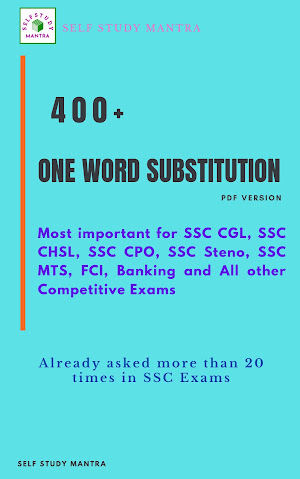
Essay Writing in English

Important Topics
- Essay in English
- Essay in Hindi
- 20 Essays for IBPS PO Descriptive Paper
- Trending Essay Topics
- IBPS PO Previous Year Descriptive Paper
- Important Essays for UPSC
- Essay Topics for UPSC CAPF AC Exam
- How To Crack SSC CGL In First Attempt?
- 100 Most Important One Word Substitution
- Essay on Artificial Intelligence
- Latest Jobs | Admit Card | Result
- Essay on Global Warming
- पर्यावरण प्रदूषण: नियंत्रण के उपाय
- Daily Homework for Class 1 to 5
Blog Archive
Quick links.
- Paragraph in English
- Join Self Study Mantra through WhatsApp, Facebook, Telegram
- Advertise With Us
- Career with Us
- Privacy Policy
- Disclaimer, Terms and Condition
- 10 Lines 13
- Best Books for SSC CGL 2
- Biography 6
- Education System 6
- English Grammar 1
- Essay in Hindi 18
- Essay Topics 32
- essay writing 150
- Farmer Welfare Schemes 1
- Important National and International Days 32
- Mathematics 5
- One Word Substitution 2
- Online Classes 3
- Paragraph Writing 19
- Political Science 1
- Pollution 7
- Republic Day 1
- Speech in Hindi 1
- SSC Exams 5
- Study Tips 7
- जीवन परिचय 6

Azadi Ka Amrit Mahotsav Essay in English

Essay on Advantages and Disadvantages of Online Classes

Important Days in 2024 | Important National and International Days | Important Days and Dates
Copyright (c) 2019-24 Self Study Mantra All Rights Reseved
Naomi Osaka: ‘It’s O.K. Not to Be O.K.’
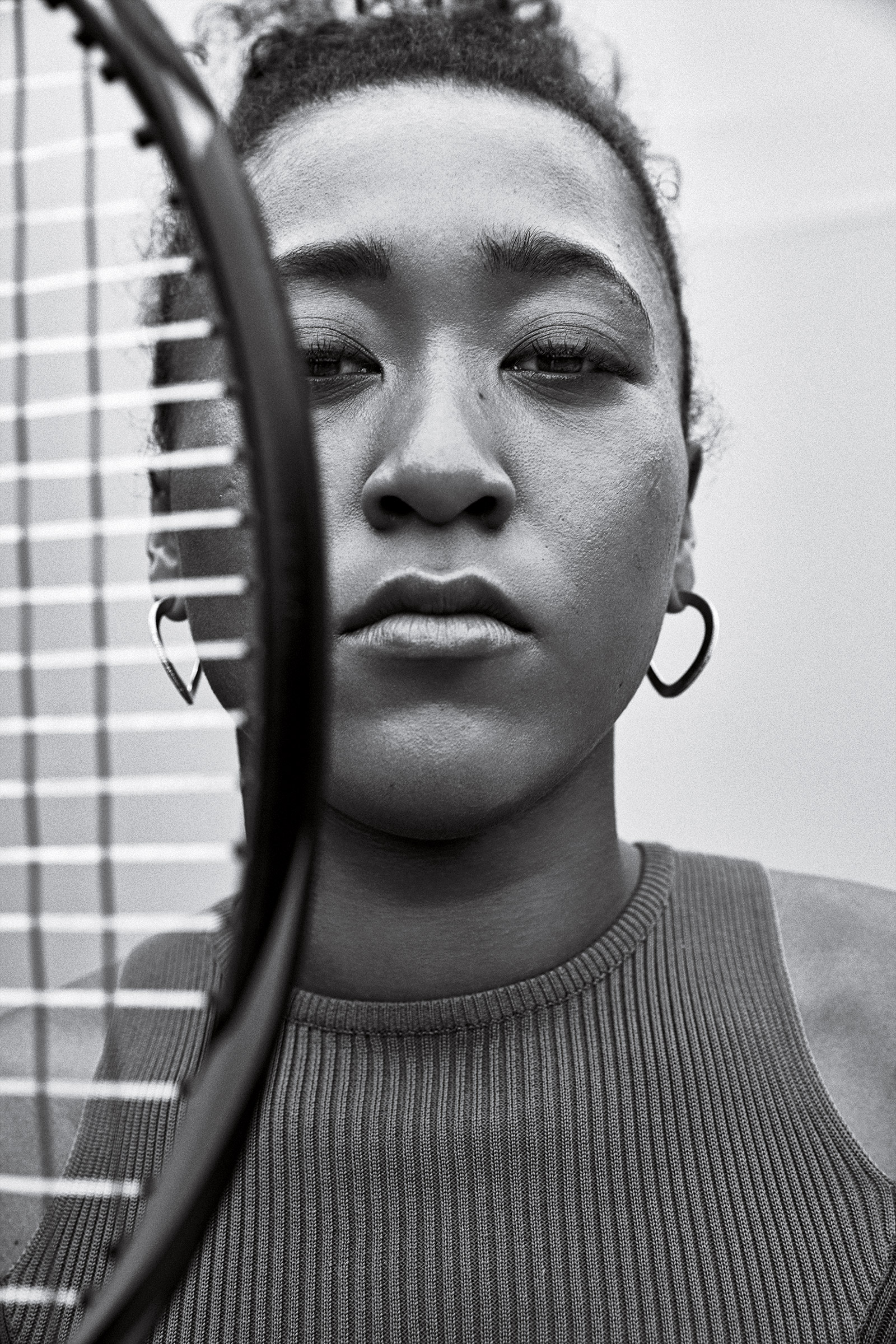
Life is a journey.
In the past few weeks, my journey took an unexpected path but one that has taught me so much and helped me grow. I learned a couple of key lessons.
Lesson one: you can never please everyone. The world is as divided now as I can remember in my short 23 years. Issues that are so obvious to me at face value, like wearing a mask in a pandemic or kneeling to show support for anti-racism , are ferociously contested. I mean, wow. So, when I said I needed to miss French Open press conferences to take care of myself mentally, I should have been prepared for what unfolded.
Lesson two was perhaps more enriching. It has become apparent to me that literally everyone either suffers from issues related to their mental health or knows someone who does. The number of messages I received from such a vast cross section of people confirms that. I think we can almost universally agree that each of us is a human being and subject to feelings and emotions.
Perhaps my actions were confusing to some because there are two slightly different issues at play. In my mind they overlap, and that’s why I spoke about them together, but let’s separate them for the sake of discussion.
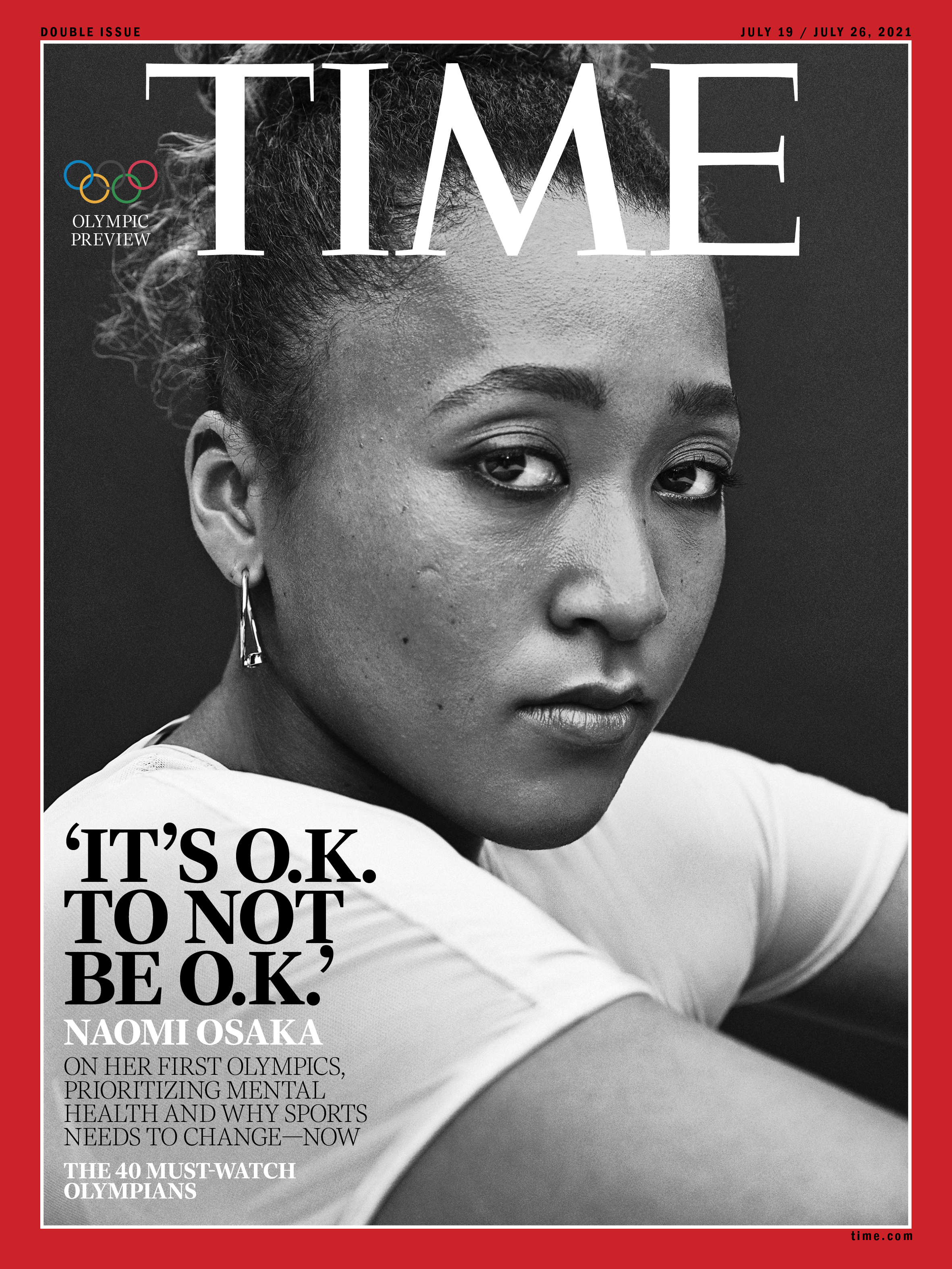
Get a print of TIME’s Tokyo Olympics cover featuring Naomi Osaka here
The first is the press. This was never about the press, but rather the traditional format of the press conference. I’ll say it again for those at the back: I love the press; I do not love all press conferences.
I have always enjoyed an amazing relationship with the media and have given numerous in-depth, one-on-one interviews. Other than those super-stars who have been around much longer than I (Novak, Roger, Rafa, Serena), I’d estimate that I’ve given more time to the press than many other players over recent years.
I always try to answer genuinely and from the heart. I’ve never been media-trained, so what you see is what you get. The way I see it, the reliance and respect from athlete to press is reciprocal.
However, in my opinion (and I want to say that this is just my opinion and not that of every tennis player on tour), the press-conference format itself is out of date and in great need of a refresh. I believe that we can make it better, more interesting and more enjoyable for each side. Less subject vs. object; more peer to peer.
Upon reflection, it appears to me that the majority of tennis writers do not agree. For most of them, the traditional press conference is sacred and not to be questioned. One of their main concerns was that I might set a dangerous precedent, but to my knowledge, no one in tennis has missed a press conference since. The intention was never to inspire revolt, but rather to look critically at our workplace and ask if we can do better.
I communicated that I wanted to skip press conferences at Roland Garros to exercise self-care and preservation of my mental health. I stand by that. Athletes are humans. Tennis is our privileged profession, and of course there are commitments off the court that coincide. But I can’t imagine another profession where a consistent attendance record (I have missed one press conference in my seven years on tour) would be so harshly scrutinized .
Perhaps we should give athletes the right to take a mental break from media scrutiny on a rare occasion without being subject to strict sanctions.
In any other line of work, you would be forgiven for taking a personal day here and there, so long as it’s not habitual. You wouldn’t have to divulge your most personal symptoms to your employer; there would likely be HR measures protecting at least some level of privacy.
In my case, I felt under a great amount of pressure to disclose my symptoms—frankly because the press and the tournament did not believe me. I do not wish that on anyone and hope that we can enact measures to protect athletes, especially the fragile ones. I also do not want to have to engage in a scrutiny of my personal medical history ever again. So I ask the press for some level of privacy and empathy next time we meet.
There can be moments for any of us where we are dealing with issues behind the scenes. Each of us as humans is going through something on some level. I have numerous suggestions to offer the tennis hierarchy, but my No. 1 suggestion would be to allow a small number of “sick days” per year where you are excused from your press commitments without having to disclose your personal reasons. I believe this would bring sport in line with the rest of society.
Finally, I want to thank everyone who supported me. There are too many to name, but I want to start with my family and friends, who have been amazing. There is nothing more important than those relationships. I also want to thank those in the public eye who have supported, encouraged and offered such kind words.
Michelle Obama , Michael Phelps, Steph Curry , Novak Djokovic, Meghan Markle , to name a few. Furthermore, I am eternally grateful to all my partners. Although I am not surprised as I purposefully chose brand partners that are liberal, empathetic and progressive, I am still tremendously thankful.
After taking the past few weeks to recharge and spend time with my loved ones, I have had the time to reflect, but also to look forward. I could not be more excited to play in Tokyo. An Olympic Games itself is special, but to have the opportunity to play in front of the Japanese fans is a dream come true. I hope I can make them proud.
Believe it or not, I am naturally introverted and do not court the spotlight . I always try to push myself to speak up for what I believe to be right, but that often comes at a cost of great anxiety. I feel uncomfortable being the spokesperson or face of athlete mental health as it’s still so new to me and I don’t have all the answers. I do hope that people can relate and understand it’s O.K. to not be O.K., and it’s O.K. to talk about it. There are people who can help, and there is usually light at the end of any tunnel.
Michael Phelps told me that by speaking up I may have saved a life. If that’s true, then it was all worth it.
More from TIME TIME interviewed Naomi Osaka ahead of the 2019 Australian Open
Read more about the Tokyo Olympics:
- Motherhood Could Have Cost Olympian Allyson Felix. She Wouldn’t Let It
- ‘Unapologetic and Unafraid.’ Sue Bird Stares Down Olympic Glory in Tokyo and Equity Off the Court
- Meet 6 Heroes Who Helped Battle COVID-19 Before Competing in the Tokyo Olympics and Paralympics
- Tokyo’s Plan to Avoid Pandemic Disaster During the Olympics
- The Olympic Refugee Team Was Created to Offer Hope. Some Athletes Are Running Away From It
- 48 Athletes to Watch at the Tokyo Olympics
More Must-Reads From TIME
- Jane Fonda Champions Climate Action for Every Generation
- Passengers Are Flying up to 30 Hours to See Four Minutes of the Eclipse
- Biden’s Campaign Is In Trouble. Will the Turnaround Plan Work?
- Essay: The Complicated Dread of Early Spring
- Why Walking Isn’t Enough When It Comes to Exercise
- The Financial Influencers Women Actually Want to Listen To
- The Best TV Shows to Watch on Peacock
- Want Weekly Recs on What to Watch, Read, and More? Sign Up for Worth Your Time
Contact us at [email protected]
- Skip to main content
- Keyboard shortcuts for audio player

Live Updates: The Tokyo Olympics
Tokyo olympics: 10 storylines that make these summer games unique.

Merrit Kennedy

U.S. gymnast Simone Biles, shown here last month at the U.S. Gymnastics Championships, is seeking a second all-around Olympic gold medal. Tony Gutierrez/AP hide caption
U.S. gymnast Simone Biles, shown here last month at the U.S. Gymnastics Championships, is seeking a second all-around Olympic gold medal.
TOKYO — The Tokyo Summer Olympics are here.
The start of the largest event in sports after a year's postponement is a sign of hope for many . But critics view holding the Games during pandemic times as an unacceptable risk to the world's top athletes and the Japanese people.
For months, questions have persisted about whether these Olympics, which are deeply unpopular in Japan, will actually happen.
Now we know the answer is ( almost surely ) yes. We're just a few hours away from the first event.

The Tokyo Olympics Are On — For Now — As Athletes Train Through The Uncertainty
Despite the criticism and the extreme logistical challenges of putting on the Games, thousands of athletes, journalists and officials have streamed into Japan.
The strict safety protocols haven't been able to stop positive coronavirus cases from surfacing in the Olympic bubble as Japanese officials try to keep them contained and away from a largely unvaccinated population. In Tokyo, after much back and forth, organizers decided to hold the events without any spectators in the stands.

What It Takes To Get To Tokyo To Cover The Olympics
Against great odds, the world's top athletes are about to take the spotlight. Here are some key things to know about the first half of the Games:
1. Soccer and softball will start competition before the opening ceremony

Members of the U.S. women's soccer team during a training session this month in Miyazaki, Japan. Brad Smith/ISI Photos/Getty Images hide caption
Good news for anyone who simply can't wait for the Games to start – you'll be able to catch U.S. women play their first games of soccer and softball two days before the opening Ceremony. The U.S. women's soccer team will square off against Sweden. The game will start before the sun rises on the East Coast, at 4:30 a.m. Wednesday.
The U.S. women's team is trying to become the first ever reigning women's World Cup champion to win Olympic gold.
U.S. women's softball players will face Italy in a matchup starting at 11:00 p.m. ET on Tuesday. Softball is making its return to the Olympics for the first time since 2008, when Japan took gold. Since then, U.S. has won the most world titles, followed by Japan. Baseball is also marking its return to the Games.
2. The Opening Ceremony itself will look a lot different than past years
The three-hour ceremony marking the official start of the Games will begin at 7 a.m. ET on Friday. Organizers have released very little practical information about what we'll see at the ceremony, which is themed "United by Emotion" and directed by Japanese comedian Kentaro Kobayashi.
But we do know that like the Games in general in Tokyo, there will not be spectators watching in person, though some officials, VIPs and members of the press will be in the stands. A major feature of the Opening Ceremony is the "Parade of Nations," when groups of athletes from each country walk into the arena. Fewer athletes are expected to attend the ceremony this time because many are not allowed to stay for the entire Games due to coronavirus restrictions.
3. The first medals will be awarded Saturday, and the winners will put the prizes on themselves

Medal winners at the Tokyo Olympics will place them around their own necks due to safety protocols to prevent the spread of the coronavirus. Alexei Zavrachayev/Alexei Zavrachayev/TASS hide caption
The first medals of the Games are expected to be handed out to the winners of the women's 10m air rifle final – and 11 total sets of medals will be up for grabs on that day.
In previous Olympics, dignitaries placed the medals around the athletes' necks as they stood on the podium and leaned forward during the medal ceremony. But Olympic officials have announced that due to coronavirus concerns, athletes will be presented with a medal on a tray and then will put them around their own necks .
The medals are actually made of recycled materials. The Japanese organizers say they asked citizens to contribute small electronics devices and used metal extracted from them to create about 5,000 medals.
4. Swimming gets underway, led by Katie Ledecky
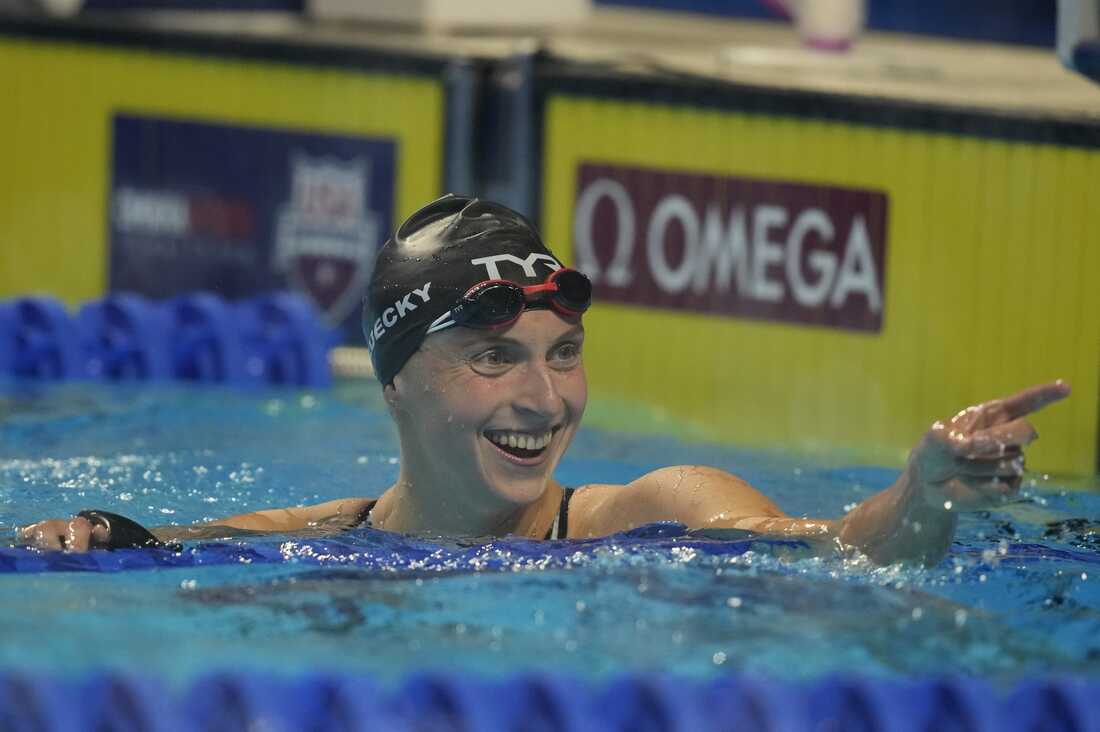
U.S. swimming star Katie Ledecky, shown here during U.S. Olympic Swim Trials last month, is competing in up to six events at the Tokyo Olympics. Charlie Neibergall/AP hide caption
U.S. star Katie Ledecky, a six-time Olympic medalist, is competing in up to six events. That includes three she holds world records for – the 400 meter freestyle, 800 meter freestyle and 1,500 meter freestyle. Caeleb Dressel, who is yet to win individual Olympic gold, is competing in three individual events and up to four relay events. He holds the world record in the 100 meter butterfly – a record he could break in Tokyo.
Other swimmers to watch include Simone Manuel, who narrowly won the 50 meter freestyle event at Olympic Trials. The team's youngest swimmer, 15-year-old Katie Grimes, will compete in the 800 meter freestyle event. Swimming events span from Saturday July 24 through the evening of July 31 ET.
5. Surfing and skateboarding make their Games debut
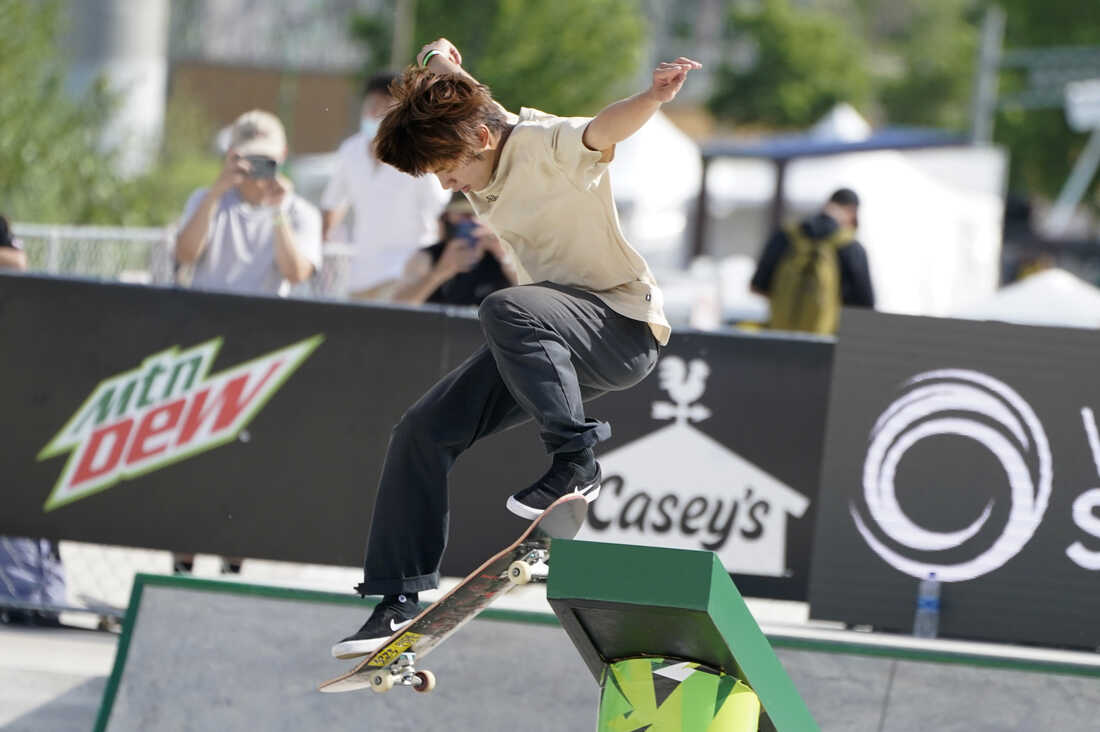
Japan's Yuto Horigome, shown here during a skateboarding competition in May, is a medal contender in the sport's Olympic debut. Charlie Neibergall/AP hide caption
Japan's Yuto Horigome, shown here during a skateboarding competition in May, is a medal contender in the sport's Olympic debut.
Two board sports with rebellious, counter-culture vibes will be part of the Olympics for the first time. It's seen as an effort to attract younger viewers to the largest competition in sports. For surfing, nature — and an expert wave forecaster — will decide when the competition begins. If the waves cooperate in Chiba's Tsurigasaki Beach, about 40 miles from Tokyo, we could see the finals in this competition in the evening on July 27 ET.
Countries with longtime surfing histories such as the U.S., Australia and Brazil are expected to do well in the sport's debut.
Skateboarders will compete in two categories: street and park. The street skaters will show their skills on July 24 and 25 ET on stairs, handrails, curbs, benches, walls and banks. For the park competition on August 3 and 4 ET, athletes will demonstrate their mid-air tricks and spins and skills in a course that resembles a bowl.
The U.S.'s Nyjah Huston is a medal hopeful in the men's street competition, and Japan has strong contenders in the event, including Yuto Horigome. 13-year old U.K. skater Sky Brown, one of the youngest competitors at the Olympics, is a medal contender in the women's park event.
6. Women's Gymnastics starts, with Simone Biles expected to dominate
Simone Biles, the best gymnast in the world, is essentially competing against herself at this point. She recently debuted a move that is so difficult, no other female gymnast has ever performed it in competition. Biles is hoping to replicate her success at the 2016 Olympics and win her second all-around title, and the final for that event starts at 6:50 a.m. ET on July 29. The U.S. women's team final is two days earlier, on July 27.
A big question is who will take silver in the women's all-around competition. Biles' teammate Sunisa Lee is a medal contender, as is Viktoria Listunova from Russia and Mai Murakami from Japan.
7. One race will determine the fastest woman alive
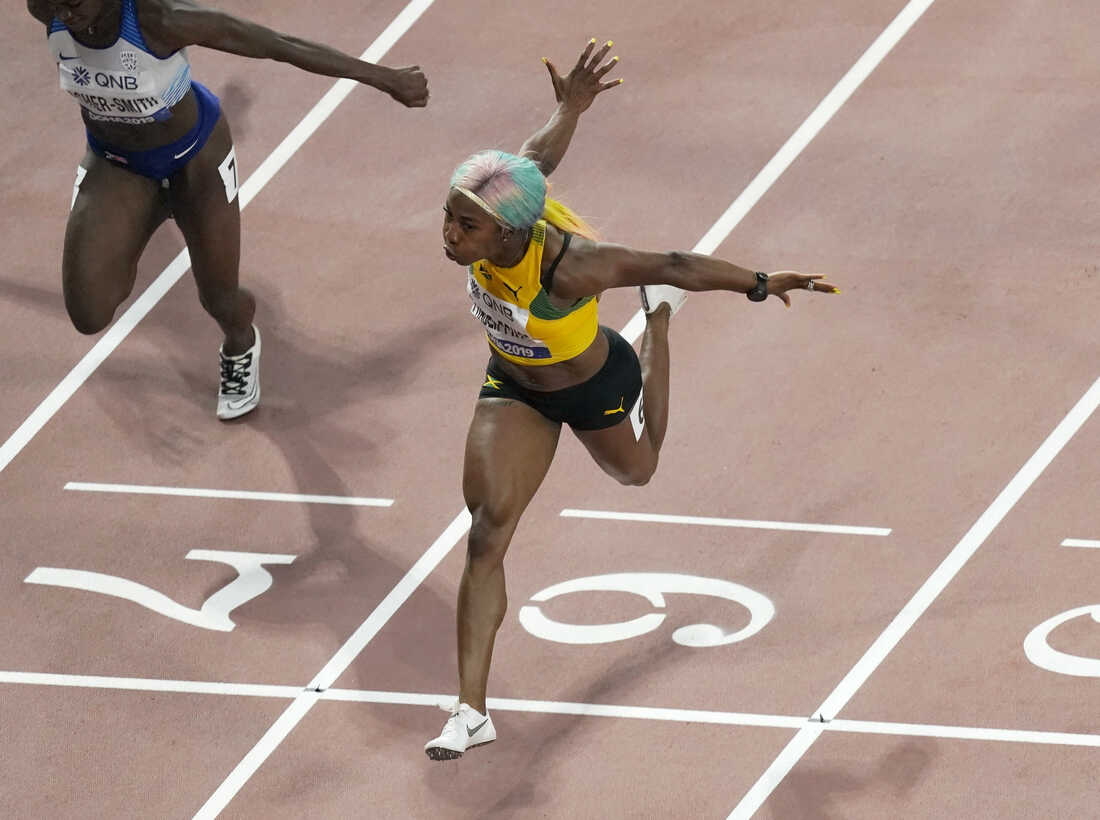
Jamaica's Shelly-Ann Fraser-Pryce, running at the World Athletics Championships in 2019, is going for her third Olympic gold in the 100 meter race. Nick Didlick/AP hide caption
The most highly anticipated women's sprint event, the 100 meter final, is set to blaze down the track in Tokyo on Saturday, July 31 at 8:50 a.m. ET. Jamaica's Shelly-Ann Fraser-Pryce, who has won the event in two previous Olympics, is trying to become the first woman to win three gold medals at this distance.
The runner viewed as the best hope for the U.S. to medal in the event won't be on the starting line. Sha'Carri Richardson , who won the 100 meter race at the U.S. Olympic Trials, was later disqualified after testing positive for the psychoactive component of marijuana.
8. The U.S. women's basketball team aims for its seventh gold medal in a row
The U.S. women's basketball team is overwhelmingly dominant — it has won gold in every Summer Olympics since 1996, an astounding six times in a row. They haven't lost a game at the Olympics since 1992 — and that loss was the only one since 1984.
The members of the team collectively have a lot of Olympic experience. Two team members — Sue Bird, 40, and Diana Taurasi, 39 — are gearing up for their fifth Olympics.
The U.S. women will play their first game at 12:40 a.m. ET on Tuesday, July 27. And if all goes well, they'll compete for yet another gold medal on the evening of Sunday Aug. 7 ET.
9. Athletes are expected to protest — possibly even at medal ceremonies

Gwendolyn Berry (left) turned away from the U.S. flag in protest on the podium after the Women's Hammer Throw final of the 2020 U.S. Olympic Track & Field Team Trials last month. Patrick Smith/Getty Images hide caption
What would a gathering of the world's athletes be these days without protest? In recent years, athlete activism has become common — and controversial.
Olympic activism will be on display as early as Wednesday, when competition begins in women's soccer and softball. The British women's soccer team opens against Chile (Wednesday July 21 at 3:30 a.m. ET), with a pledge to collectively take a knee before its games in Tokyo. "It's important we use our platforms to help in any way we can," said English defender Demi Stokes.

Gwen Berry Changed Olympic Trials Protest Rules Last Year And Is Still Protesting
The International Olympic Committee recently relaxed its rule banning political demonstrations at the games, but the committee has been criticized for still not allowing any form of protest during medal ceremonies, when it's bound to have greatest impact. IOC President Thomas Bach recently warned against "divisive statements" upsetting "peaceful competition." We'll see if Olympians choose to challenge that, including U.S. hammer thrower Gwen Berry, who turned her back on the U.S. flag during a medal ceremony at last month's track and field Olympic Trials.
10. The big question is how much coronavirus will ultimately affect the Games
Athletes and others in the Olympic bubble have to go through many rounds of testing and strict safety measures to try to keep the coronavirus contained. Tens of thousands of people have entered Japan for the Olympics, and the first positive tests have popped up in the Olympic village. International Olympic Committee officials acknowledge that risks exist but stress that they are minimal.
Still, as foreign visitors continue to stream into the country, questions remain about whether the overwhelmed Olympic organizers will be able to keep positive cases isolated from other competitors and the general population. It's also clear that a positive case on a team could potentially mean the whole group wouldn't be allowed to compete. If medal favorites are forced to quarantine, that could mean major upsets.
NPR's Tom Goldman and Mandalit del Barco contributed to this report.
- Share on twitter (New window)
- Share on facebook (New window)
- Share on email (New window)
- Share on linkedin (New window)
- Olympic Studies Center
- Other sites
- Olympic World Library Network
- Go to the menu
- Go to the content
- Go to the search
- OSC Catalogue
- INDERSCIENCE
- Search in all sources

How Covid changed sport : a case study of the 2020 Tokyo Olympic Games / Boria Majumdar
Majumdar, Boria
This essay aims to document how world sport has changed since Covid. It is based on an ethnography conducted during the 2020 Tokyo Olympics. Using field research in Japan, it seeks to highlight the challenges in Olympics coverage going forward while also arguing that Covid has meant the media must be much more focused and knowledgeable to be able to cover the Games well.
- Description
- IN: Sport in society: cultures, commerce, media, politics, Ahead of print, 16 September 2021, pp. 1-8.
- Tokyo 2020, Olympic Games
- Tokyo 2020, Paralympic Games
- Export HTML
- Export RIS (Zotero)
Consult online
Other research, selection : zoom covid-19 - impact on the olympic movement.

Understanding COVID-19 : a hybrid threat and its impact on sport mega-events : a focus on Japan and the Tokyo 2020 Olympic Games

Redesigning the Games? : the 2020 Olympic Games, playbooks and new sports event risk management tools

How Covid changed sport : a case study of the 2020 Tokyo Olympic Games

The Tokyo postponement : lessons learned for the Olympic Movement
![More info on 'Potentially prolonged psychological distress from postponed Olympic and Paralympic Games during COVID-19 : career uncertainty in elite athletes / Anders Håkansson ... [et al.]' Potentially prolonged psychological distress from postponed Olympic and Paralympic Games during COVID-19 : career uncertainty in elite athletes / Anders Håkansson ... [et al.] | Håkansson, Anders](https://library.olympics.com/ui/skins/CIOL/portal/front/images/General/DocType/EXTR_LARGE.png)
Potentially prolonged psychological distress from postponed Olympic and Paralympic Games during COVID-19 : career uncertainty in elite athletes

"A Blank Slate" : preparing for Tokyo 2021 during COVID-19

What predicts the mood of athletes involved in preparations fo Tokyo 2020

A Games like no other

Tokyo 2020 and its postponement : an economic prognosis

The long road to Tokyo

Tokyo Olympic Games : postponement or cancellation ?

Olympic recoveries
![More info on 'The COVID-19 pandemic and Olympic/Paralympic athletes’ developmental challenges and possibilities in times of a global crisis-transition / Natalia B. Stambulova... [et al.]' The COVID-19 pandemic and Olympic/Paralympic athletes’ developmental challenges and possibilities in times of a global crisis-transition / Natalia B. Stambulova... [et al.] | Stambulova, Natalia B](https://library.olympics.com/ui/skins/CIOL/portal/front/images/General/DocType/EXTR_LARGE.png)
The COVID-19 pandemic and Olympic

Here we go : historic postponement

Impact of COVID-19 on athletes and coaches, and their values in Japan : repercussions of postponing the Tokyo 2020 Olympic and Paralympic Games

“Time for recovery” or “utter uncertainty”? the postponement of the Tokyo 2020 Olympic Games through the eyes of Olympic athletes and coaches : a qualitative study

We are the Games : the COVID-19 pandemic and athletes’ voices = Somos los Juegos: la pandemia de la COVID-19 y las voces de los
![More info on 'Modulators of the personal and professional threat perception of Olympic athletes in the actual COVID-19 Crisis / Vicente Javier Clemente-Suárez ... [et al.]' Modulators of the personal and professional threat perception of Olympic athletes in the actual COVID-19 Crisis / Vicente Javier Clemente-Suárez ... [et al.] | Clemente-Suárez, Vicente Javier](https://library.olympics.com/ui/skins/CIOL/portal/front/images/General/DocType/EXTR_LARGE.png)
Modulators of the personal and professional threat perception of Olympic athletes in the actual COVID-19 Crisis
What do you think of this resource give us your opinion.
Fields marked with the symbol * are mandatory.
Export in progress
Change your review, memorise the search.
The search will be preserved in your account and can be re-run at any time.
Your alert is registered
You can manage your alerts directly in your account
Subscribe me to events in the same category
Subscribe to events in the category and receive new items by email.
Frame sharing
Copy this code and paste it on your site to display the frame
Or you can share it on social networks
- Share on twitter(New window)
- Share on facebook(New window)
- Share on email(New window)
- Share on print(New window)
- Share on linkedin(New window)
Confirm your action
Are you sure you want to delete all the documents in the current selection?
Choose the library
You wish to reserve a copy.
Register for an event
Registration cancellation.
Warning! Do you really want to cancel your registration?
Add this event to your calendar
Exhibition reservation.

Essay on Tokyo Olympics 2021: Triumph of Resilience and Global Unity
The Tokyo Olympics 2021, a testament to human resilience and determination, unfolded against the backdrop of unprecedented challenges. Originally scheduled for 2020, the event faced a one-year postponement due to the global COVID-19 pandemic. The resolute decision to proceed with the Olympics not only showcased the spirit of sport but also became a symbol of global unity in overcoming adversity. This essay explores the significance of the Tokyo Olympics, reflecting on the journey, accomplishments, and the unifying spirit that defined this historic event.
Quick Overview:
- Postponement and Adaptation: The Tokyo Olympics faced an unprecedented challenge with the outbreak of the COVID-19 pandemic. The decision to postpone the event by a year reflected the commitment to prioritize the safety and well-being of athletes, officials, and the global community. The organizers showcased adaptability and resilience in navigating the complexities of hosting a major international event during a pandemic.
- Athletic Achievements: The Tokyo Olympics witnessed outstanding athletic performances across various sports. Athletes from around the world, despite facing disruptions in their training schedules, showcased incredible determination, breaking records and achieving remarkable feats. The Games served as a platform for individuals to overcome personal and global challenges through the pursuit of excellence.
- Global Unity: The Olympics have always been a symbol of global unity, bringing nations together through the language of sports. The Tokyo Olympics amplified this spirit, emphasizing the importance of solidarity in the face of shared challenges. Athletes from diverse backgrounds competed side by side, fostering a sense of camaraderie and mutual respect that transcended geopolitical boundaries.
- Innovative Technologies: The Tokyo Olympics embraced innovative technologies, enhancing the viewer experience and the efficiency of the event. From virtual fan engagement to the use of advanced sports analytics, the Games demonstrated how technology can be harnessed to create a more inclusive and immersive sporting spectacle, even in the absence of physical audiences.
- Focus on Mental Health: The Tokyo Olympics marked a shift in acknowledging and addressing the mental health challenges faced by athletes. High-profile athletes openly discussed the pressures and mental health struggles, sparking important conversations about the well-being of competitors. This shift in perspective aimed to destigmatize mental health issues and promote a more holistic approach to athlete welfare.
Conclusion: In conclusion, the Tokyo Olympics 2021 will be remembered not only for the athletic prowess displayed but also for the resilience, adaptability, and global unity it symbolized. The decision to proceed with the Games in the face of adversity sent a powerful message about the indomitable spirit of humanity and the role of sports in bringing people together.
As the world continues to grapple with challenges, the Tokyo Olympics serves as a beacon of hope and inspiration. It reminds us that, even in the face of uncertainty, the pursuit of excellence, the celebration of diversity, and the fostering of global unity through sports can prevail. The triumphs and challenges of the Tokyo Olympics are a testament to the enduring power of the Olympic movement and its ability to inspire, uplift, and unite people from all corners of the globe.

Rahul Kumar is a passionate educator, writer, and subject matter expert in the field of education and professional development. As an author on CoursesXpert, Rahul Kumar’s articles cover a wide range of topics, from various courses, educational and career guidance.
Related Posts

How To Write An Argumentative Essay On Political Science?


Creative Essay Writing Techniques: How To Write a Creative Essay

10 Lines on My Mother in English
Articles on 2021 Tokyo Olympics
Displaying 1 - 20 of 39 articles.
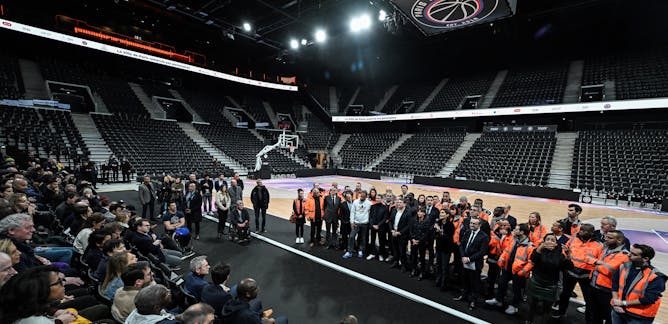
Does hosting the Olympics, the World Cup or other major sports events really pay off?
Ivan Savin , ESCP Business School
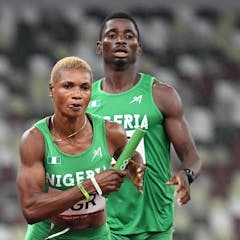
Pasha 125: Nigeria can regain its lost athletics glory. Here’s how
Wale Fatade , The Conversation and Usifo Omozokpea , The Conversation

Saint Boy’s rebellion spurs debate about ethical treatment of horses at the Olympics — and beyond
Kendra Coulter , Brock University
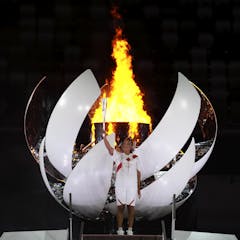
Black women athletes ruptured destructive and limiting beliefs at the Tokyo Olympics
Sabrina Razack , University of Toronto ; Braeden McKenzie , University of Toronto , and Janelle Joseph , University of Toronto
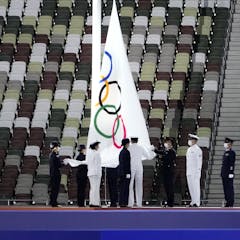
Fewer viewers, nervous sponsors: The Olympics must rethink efforts to stay relevant
Cheri L. Bradish , Toronto Metropolitan University and Nicholas Burton , Brock University
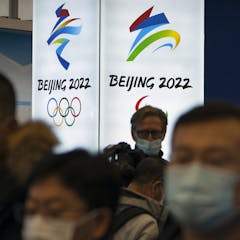
Boycotting the next Olympics in Beijing will hurt athletes: Here’s a better idea
Bruce Kidd , University of Toronto
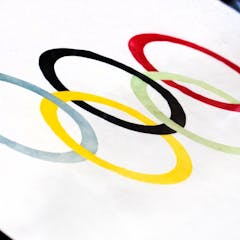
Why designing an Olympic logo is so difficult
Christopher Brown , Nottingham Trent University
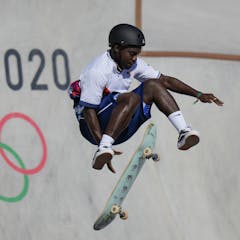
From outlier to Olympic sport: How skateboarding made it to the Tokyo Games
MacIntosh Ross , Western University
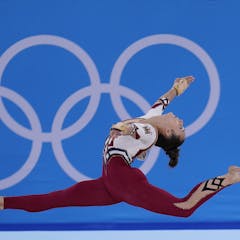
The Tokyo Olympics are billed as the first gender equal Games, but women still lack opportunities in sport
Ann Pegoraro , University of Guelph and Felix Arndt , University of Guelph
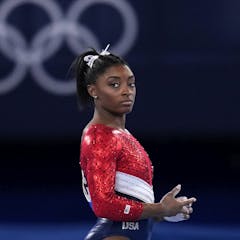
Simone Biles and Naomi Osaka put the focus on the importance of mental performance for Olympic athletes
Nicole W. Forrester , Toronto Metropolitan University
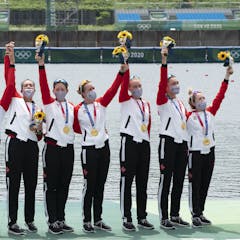
Why women are owning the podium for Canada at the Tokyo Olympics
Jane Thornton , Western University

The politics of the Olympics: How a counter-movement in 1963 changed the Games forever
David Webster , Bishop's University
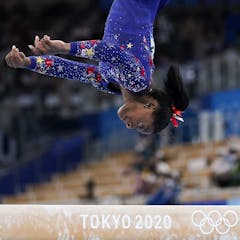
What Olympic gymnasts can teach us about improving our balance
Anthony Blazevich , Edith Cowan University
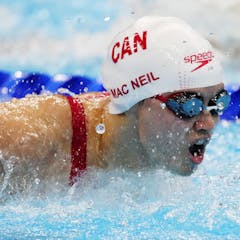
Record-setting performances at the Tokyo Olympics come after months of pandemic-induced stress
Angela Schneider , Western University

Tokyo Olympics: winning could become about managing COVID stress
Keith Parry , Bournemouth University ; Emma Kavanagh , Bournemouth University , and Eric Anderson , University of Winchester

The Olympic movement claims political neutrality. In reality, that ideal is often selectively applied
Daryl Adair , University of Technology Sydney

In the wake of Indian Residential School findings, how can we cheer for Canada at the Olympics?
Estee Fresco , York University, Canada
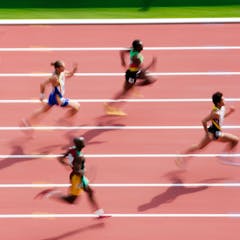
Tokyo Olympics: what are the limits of human performance? Podcast
Gemma Ware , The Conversation and Daniel Merino, The Conversation

The WHO and the IOC are playing with lives at state-of -emergency Tokyo Olympics
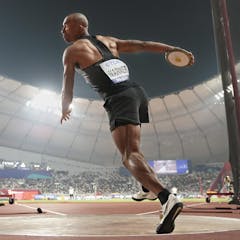
How the COVID-19 delay of the Tokyo Olympics helped some athletes break records
Related topics.
- Elite athletes
- International Olympic Committee (IOC)
- Listen to this article
- Tokyo 2020 Olympic Games
- Tokyo Olympics
Top contributors
Clinician Scientist, Canada Research Chair in Injury Prevention and Physical Activity for Health, Sport Medicine Physician, Schulich School of Medicine & Dentistry, Western University
Professor Emeritus of Kinesiology and Physical Education, University of Toronto
Assistant Professor, Kinesiology, Western University
Professor of Biomechanics, Edith Cowan University
Assistant Professor, School of Media, Toronto Metropolitan University
Honorary Professor, School of Kinesiology, Western University, London, Canada; Adjunct Fellow, Olympic Scholar and Co-Director of the Olympic and Paralympic Research Centre, Institute for Health and Sport, Victoria University
Director, International Centre for Olympic Studies, Western University
Associate Principal Research Fellow, Burnet Institute
Head Of Department in Department of Sport & Event Management, Bournemouth University
Associate Professor of Sport Management, University of Technology Sydney
Professor in Sociology of Sport and Gender, University of Waikato
Lecturer in Economics, Finance and Entrepreneurship, Aston University
Professor Emerita of Sociology and Equity Studies in Education, University of Toronto
Assistant Professor of Sport Management, Bond Business School, Bond University
Associate Professor in Sport Psychology and Safe Sport, Bournemouth University
- X (Twitter)
- Unfollow topic Follow topic
- CBSSports.com
- Fanatics Sportsbook
- CBS Sports Home
- NCAA Tournament
- W. Tournament
- Champions League
- Motor Sports
- High School
- Horse Racing
Men's Brackets
Women's Brackets
Fantasy Baseball
Fantasy football, football pick'em, college pick'em, fantasy basketball, fantasy hockey, franchise games, 24/7 sports news network.
- CBS Sports Golazo Network
- March Madness Live
- PGA Tour on CBS
- UEFA Champions League
- UEFA Europa League
- Italian Serie A
- Watch CBS Sports Network
- TV Shows & Listings
The Early Edge
A Daily SportsLine Betting Podcast
With the First Pick
NFL Draft is coming up!
- Podcasts Home
- Eye On College Basketball
- The First Cut Golf
- NFL Pick Six
- Cover 3 College Football
- Fantasy Football Today
- Morning Kombat
- My Teams Organize / See All Teams Help Account Settings Log Out
Olympics 2021: Top storylines to follow heading into the Tokyo Games
From simone biles to katie ledecky, team usa soccer to men's basketball and all the new sports in tokyo, a full-fledged primer on what to know about the 2021 games.
The Olympics are the biggest stage in global sports and attract the most media of any organized competition on the planet. The Games of the XXXII Olympiad return this week and will be held in Tokyo. After the 2020 Games were delayed a year due the ongoing COVID-19 global pandemic, it was determined that the Olympics would be pushed back no further.
The Games are scheduled to feature 339 events in 33 sports. As is the case with every Olympics, the storylines are plentiful. We're here to give you an advance guide of what to know before the opening ceremony happens Friday.
Here are 10 plot points to follow for what will be a highly publicized, and inevitably debatable, Games.
1. COVID-19 hovers over everything
As if any story could be bigger than the biggest situation to afflict the entire planet in decades. In Japan, COVID-19 cases are higher than they've been in six months, and athletes have been affected. On the American end, tennis player Coco Gauff announced Sunday she tested positive and would not be able to compete . In women's gymnastics, an alternate on the team has tested positive and another has been put into contact-tracing protocols . A worker in the Olympic Village has also tested positive.
This situation may get worse, and there's no telling who could have their eligibility compromised. There are huge public health questions, scrutiny over vaccinations, potential forfeitures of competition by athletes. We already know of one high-profile athlete -- American swimmer Michael Andrew -- who is not vaccinated and is therefore increasing his risk of disqualification. The same goes for American track athlete Cole Hocker .
With no fans in attendance, the 2021 Games are being put on purely as a TV show (which is mostly what the Olympics has evolved into over the past 20 years). The coronavirus pandemic will hover over every element, every day, and nearly every moment of the Games due to the state-of-emergency circumstances in Japan. You won't see fans in the stands, and it's all too easy, unfortunately, to envision a scenario in which athletes wind up being disqualified due to positive tests. Even the medal ceremonies will be different this time around: instead of the tradition of a medalist bending down to be wreathed with their prize, the gold, silver and bronze winners will be grabbing their medals themselves and putting them on .
While American sports have successfully pulled off major events -- the NBA Finals in a bubble, the Super Bowl in the thick of winter, and multi-week men's and women's NCAA Tournaments in controlled environments -- the Olympics dwarfs all of those events. Considering Japan's vaccination rate, and its state-of-emergency declaration , the number of people working and competing in the Games and the contagiousness of the Delta variant , these Olympic Games represent the biggest sporting event the planet has taken on amid COVID-19.
A majority of Japanese citizens do not even want the Games to go on , but with billions of dollars at stake, Olympics officials have decided the show will go on.
2. The Simone Biles show
In terms of American Olympians in 2021, Biles is the biggest deal, the most famous athlete, the most dominant competitor and, at the age of 24, already one of the greatest athletes in the world. She's one of the most impressive athletes in Olympic/American history and owns four gold medals and took a bronze in 2016.
She will be must-see TV in every event she competes in. Those events are likely to be:
- Team competition
- Individual all-around
- Floor exercise
- Balance beam
If Biles medals in four more events, she's the most decorated gymnast in Olympic history. Biles is generational not only in accomplishments and greatness, but her ability to transcend her sport and the Olympics and symbolize American exceptionalism.
She has no peer.
Biles has basically altered the interpretation of physics in her sport. She has "GOAT" on her leotard, and with good reason. Biles is the rare athlete who, in the prime of their career, is already regarded as an all-time great -- maybe the greatest. These Olympics can solidify that. It speaks to an athlete's greatness when you consider that, should they not wind up winning any event they compete in, that would be the biggest surprise of all. This is Biles' reality.
3. Katie Ledecky's inevitable dominance
For as captivating as Biles is, Katie Ledecky could be the more dominant athlete in her sport due to how much she's capable of literally distancing herself from the competition. Over the next two weeks, Ledecky will certifiably replace Michael Phelps as the face of American swimming.
Like Biles, Ledecky is 24. She's competing in her third Games and is expected to win gold in the:
- 200 meter freestyle
- 400 meter freestyle
- 800 meter freestyle
- 1,500 meter freestyle
Her best event, the 1,500 meter freestyle, is new to the Games this year. She'll also swim in the 4 × 200 freestyle relay and, potentially, the 4 x 100 freestyle relay.
The question isn't whether she'll win, it's whether she'll beat all her competitors by at least a pool-length (in the 800 and 1,500). Swimming can so often be a sport of inches and half-seconds, but Ledecky has turned the tide entirely. She's made swimming a spectacle of gawk due to her dominance.
There's never been a female swimmer as fast as her, on the whole, in the events she's competing in. These Games are effectively the moment where Ledecky can cement her status as an all-time Olympic legend.
4. Will Team USA men's hoops team falter?
Pretty much the only thing that could gin up additional interest in the United States men's team in advance of the Olympics happened. Team USA lost back-to-back games against Nigeria and Australia earlier in July. No matter that those two countries have NBA players dotted throughout the roster. It's basketball. It's Team USA.
Losses aren't supposed to happen.
In fact, the United States took two losses -- total -- in international play from 1992 until June of 2021. Then it lost two games in less than a week.
Obviously, Team USA -- led by Kevin Durant -- are heavy favorites to win the gold in Tokyo. Yet there's been stumbles along the way. Bradley Beal and Kevin Love were cycled off the roster and replaced by ... uh ... says here ... JaVale McGee and Keldon Johnson ? No, Zion Williamson isn't on the roster. Aside from Durant, the biggest names are Damian Lillard , Jayson Tatum , Draymond Green , Devin Booker and Khris Middleton .
Either way, getting knocked off twice in the lead-up to the Olympics will provide drama and a reason to watch. The women's national team should once again trounce to a gold. That will be enjoyable. But on the men's side, no, the world has not caught up on the hardwood with our best in basketball. But it's no longer a walkover; far from it.
The question used to be not whether or not the men would win, but by how many points. Now it's an intriguing question: How much danger is the United States men's team in to not win gold?
5. USA Swimming is stacked ... again
Swimming had always been a draw at the Summer Olympics, but Michael Phelps helped turn it into must-see television for Americans. The U.S. should perform well in Tokyo, and is expected to win more golds and the total medal count, which has been the case in every Summer Olympics since 1992. Phelps is the greatest swimmer in history and his teammate Ryan Lochte would easily rank in the top 10.
But their time is over. Here are the names to know (besides the aforementioned Ledecky):
- Simone Manuel : Won two golds and two silvers in 2016, and made history as the first Black woman to win a 100 meter gold medal. However, she failed to qualify for that event this time, so instead she'll swim in the sprint -- the 50 meter freestyle -- and look to add to her haul.
- Lily King : We need more trash-talking, unabashed swimmers. King is that. She'll try to repeat a gold medal-winning performance from 2016 in the 100 meter breaststroke. King will also swim in the 200 meter breaststroke and is likely to be on a relay team
- Regan Smith : Stanford's next great swimmer is competing in her first Olympics and is a clear threat to medal in both the 100 meter backstroke and the 200 butterfly
- Caeleb Dressel : Dressel is likely going to be the star of the men's squad. He is a freestyle monster, and he'll compete in three individual events (100 free, 100 fly, 50 free). He'll also be on the 4 x 100 free relay, potentially swimming anchor, and have two more medal opportunities in the 4 x 200 freestyle relay and the mixed 4 x 100 medley relay
- Michael Andrew : Ten years ago he was expected to be the next-best thing to Phelps by the time he made the Olympics. That didn't come to be, but Andrew has found his form and has a great shot to medal in the 100 breast, 200 IM and 50 free
- Chase Kalisz : Won silver in the 400 meter IM in 2016 and could do it again. He'll go in both the 200 meter IM and the 400. At 27, this is his moment to capitalize
- Kieran Smith : The talented swimmer out of the the University of Florida is the dark horse to emerge as a star in these Games. These won't be his last Olympics. He'll paddle in the 200 free, the 400 free and the 4 x 200 free relay
The youngest swimmer on the team is 15-year-old Katie Grimes. In total, ten teenagers are a part of the men's and women's teams. The rising star of this group is 18-year-old Torri Huske.
6. USWNT loses for first time in 44 soccer matches, seeks redemption
The United States women's national team is the most dominant female soccer enterprise in history, but in the event you forgot: The U.S. is not the reigning gold medal winner.
In 2016, a quarterfinal upset at the hands (feet?) of Sweden led to the U.S. failing to medal in women's soccer for the first time.
The big names who are back:
- Megan Rapinoe
- Carli Lloyd
- Alex Morgan
Every Olympian has their own special kind of motivation, but just about every game this team plays will be a national reason for rally. And yet, the early signs are not encouraging! The U.S. was sideswiped immediately, the victim of a 3-0 opening group stage loss against none other than -- drum roll -- Sweden. This is more than a wakeup call; it's a disturbing flashback to the stunning defeat in the 2016 Games. Two days before the opening ceremony begins, the pressure is already on.
7. The 17-year-old who could shine in men's track
Thirteen medalists in American track and field from the Rio Olympiad will compete in Tokyo. The most compelling person on the whole team was 12 the last time we had an Olympics. His name is Erriyon Knighton.
The second (or less) you break a record held by Usain Bolt, you become a story the world should know. And when you break two of Bolt's marks, then the hype finds a rocket. Knighton's done just that. His 20.11-second run in early June in the 200 meters bested Bolt's under-18 record from 18 years ago. At the Olympic trials, Knighton improved on his time with a 19.88 run … that he eased up on at the very end. That sprint was better than Bolt's record as an under-20-year-old from 2004. In the final, Knighton crossed in 19.84. Two world junior records.
Can he go even lower in Tokyo?
Knighton won't turn 18 until January and, maybe, could be the face of men's track and field for the next decade. His events are the two most glamorous in the sport: the 100- and 200-meter dash. He took third in the men's 200 meters at the Olympic trials in June. According to USA Track and Field, Knighton is the youngest American male to compete in an Olympiad's track and field competition since 1964. Knighton's story is all the more incredible considering he did not compete in a major track competition until 2019, when he was 15 .
The subplot to this is Knighton is coming on as the fresh young face, while it's Noah Lyles who has been in this position the past few years in the lead-up to his first Olympics. Lyles ran the fastest time (19.74) at June's trials, with Kenny Bednarek taking second, Knighton third. The 200 is Lyles' to lose, but Knighton's emergence makes for great theater during the second half of the Olympics' schedule. The last time an American male won a gold medal in the 200 meters? The 2004 Games.
8. Sha'Carri Richardson's ban looms over women's track
It's not even fair to say that, years from now, we'll look back on Richardson's ban on competing in the 2021 Olympics as an outdated, unfair decision. Millions believe that already . Richardson, who would've been a favorite to win gold in the 100, was kept off the US roster due to a positive marijuana test that violated the rules . The story got so big, even President Biden commented on its unmerited nature.
Richardson deserved better, and hopefully the 2024 Games in Paris will be her glorious revenge tour.
As for who is competing this year for the United States on the women's side, the ageless Allyson Felix is back for her fifth Olympics -- an unthinkable achievement for anyone who makes their living sprinting for a living. Felix, 35, will run in the 400 meters, making her the oldest American sprinter to compete in the event.
Another big-time performer is Sydney McLaughlin, who set a world record in the 400 meter hurdles at trials in June. She's the best at her event ... unless Dalilah Muhammad beats her. That duo is a lock for gold and silver, it seems.
When McLaughlin did this in June, she became the first woman in history to run the 400 hurdles in under 52 seconds.
. @GoSydGo sets the WORLD RECORD and is going to the #TokyoOlympics ! ⚡️ @usatf | #TrackFieldTrials21 pic.twitter.com/K0WYmiHiSn — #TokyoOlympics (@NBCOlympics) June 28, 2021
We've got more, including a neurobiology major from Harvard who is mastering in epidemiology. That's Gabby Thomas, who might as well represent what these Olympics are about more than any other American athlete competing. Her speciality is the 200 meters, and she'll have a great shot at taking gold there.
Another familiar name in women's track and field is Brittney Reese, who is competing in her fourth Olympics and specializes in long jump. She's taken gold and silver before.
9. The next Jim Thorpe is competing in Tokyo
And that is JuVaughn Harrison. This is a relatively small story, but boy is it a special one. Harrison did something unique in modern athletics: he won the high jump AND the long jump in the U.S. trials. That hasn't happened since Jim Thorpe -- a man considered one of the five-or-so greatest American athletes of the 20th century -- did it in 1912. So that's a wow. Harrison will compete in both in Tokyo.
Across men's and women's track and field there are 13 medal winners from the 2016 Games who are back, and six athletes who won 2019 word championship medals. The United States has a stacked roster on both sides and expects to win the gold and overall medal count, just as it has at every Olympiad since 1984.
10. New sports debuting in these Olympics
You're probably most comfortable and eager to watch the reliables: swimming, gymnastics, track and field and basketball. But for plenty, the appeal of the Olympics are the niche sports, the counterculture of the much lesser-heralded competitions that make the Olympics charming.
So, after a 13-year hiatus, baseball and softball are returning. Obviously, Major League Baseball season is ongoing, so the biggest stars in the sport will not be competing in the Olympics.
As for the new sports, here are the ones making their Olympiad debuts:
- Skateboarding!
- Sport climbing!
Surfing seems somewhat random; after all, you're dependent on the waves, brah. Karate is straight up awesome, and sport climbing means Olympians will compete in three disciplines and be judged on the aggregate of all speed climbing, lead climbing and bouldering. Should be fascinating.
The weirder the sports, the better the Olympics, I say. Can we bring back croquet, people? It was last seen in the Olympics in 1900. But four new sports is a welcomed addition to what will be the most intriguing, and controversial, Olympics -- perhaps ever.
Our Latest Olympics Stories
Gabby Douglas halts gymnastics return due to COVID-19
Austin nivison • 1 min read.
ROC loses appeal against suspension by IOC
Chris bengel • 1 min read.
Lewis responds to potential long jump rule change
2024 Olympic medals to feature pieces of Eiffel Tower
U.S. gold medal gymnast Douglas targeting 2024 Olympics
Zachary pereles • 1 min read.
Team USA gets figure skating gold after Valieva's ban
Share video.
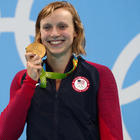
The top Tokyo Olympics storylines to follow

2024 Olympics: Taylor leading Canada with Paris on deck

Olympic women's qualifying tournament results
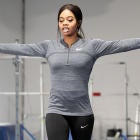
Hill explains why Green is not part of USA player pool

LeBron, Curry headline Team USA player pool

Victor Wembanyama and the 'huge boom' that could follow
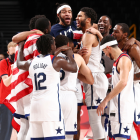
What could USA's Olympics player pool look like?

Five questions for Elana Meyers Taylor
Essay on Fest
Search this blog, essay on tokyo olympics 2021.
Olympics is the leading international sports event featuring summer and winter games where thousands of athletes participate from all over the world, The 2020 summer Olympic is the next edition of the 2016 summer Olympics held in Rio de Janeiro Brazil,
The host country of summer Olympics 2020 in Tokyo Japan, the widespread pandemic situation all over the world made the summer Olympic 2020 be rescheduled for 2021 that's why it is called as summer Olympics 2020
All the athletes from all over the world practice and wait to showcase their talents through this greatest event of all sports events, the Olympic games represent five rings as the logo of the Olympics the five rings represent five continents of the world Africa, Asia, Australia, America, and Europe.
The motto of the 2020 Tokyo Olympics is united by emotion, the flag-bearer from India at the opening ceremony of Olympics 2020 was Mary Kom and Manpreet Singh
Miraittowa is the official mascot of the 2020 summer Olympics representing the cultural heritage of Japan, In the 2020 Tokyo Olympics 205 nations along with 11 090 athletes participated, the opening and closing dates of Tokyo Olympics 2020 are 23rd July and 8th August respectively
Olympic always plays an important role to unite the global community with magnificent sports events Tokyo Olympics also established the same among all nations.
In Tokyo Olympics also the athletes have shown their capabilities the most successful country is the united states having total of 113 meters out of which 39 are gold, The other two countries which begged the maximum medals are china and japan had a total number of 88 and 58 medals respectively.
India made a remarkable position in Tokyo Olympics compared to the previous ones India backed a total of 7 medals having one Gold two Silver and four Bronze.
Also Read: Essay on Tokyo Olympics 2020 Medal Winners from India
Also read: Essay on Neeraj chopra
Short essay on Tokyo Olympics 2021
The Olympic games are known as the world's foremost athletic competition, over 200 nations participate in this event that happens once in four years, the Olympic games first began in Ancient Greece at Olympia
The first modern Olympics happened in 1896 in Athens Greece, the Olympic Games program consists of 26 sports 30 disciplines and nearly 300 events, Tokyo Olympics is scheduled to begin on July 23 after a year-long delay due to the Covid 19 Pandemic.
This is the first time that the Olympic games have been postponed and rescheduled rather than cancelled, the opening ceremony of the Tokyo Olympics 2021 will take place on July 23 at the newly built national stadium in the Japanese capital while the closing ceremony will be held on August 8, 2021, at the same venue
Leaders from around 15 countries are expected to attend the July 23rd opening ceremony of the Tokyo Olympics 10 reports in Japan have suggested that those attending the ceremony in person could be as low as 1 000 due to the pandemic
The international Olympic committee IOC approved five new sports for the Olympic games Tokyo 2020 these are surfing sport climbing skateboarding baseball and karate, a total of around 11 000 athletes from 206 countries are expected to participate in 33 sports in Tokyo Olympics 2020, Company name and logo generator
The mass code of Tokyo Olympics 2020 is named Miraitowa 14 the opening ceremony for Tokyo Olympic 2020 will start at 8 pm Japan local time,
The sporting events during Olympics 2021 can start as early as 9:00 am japan time t he gold silver and bronze medals awarded to competitors at the Olympics represents the highest levels of athletic achievement at the games, the design of the medals represents Japanese culture,
The Olympic logo also known as the Olympic rings consists of five intervened rings and represents the unity of the five inhabited continents America, Africa, Asia Australia and Europe.
There are the winter and summer Olympics that are held alternating as well, a body is known as the international Olympic committee oversees all matters regarding the Olympic games.
Also read: My favourite sport cricket essay
Also read: My favourite game badminton essay
Also read: How to promote sports and games in the country
Also read: Essay on Cristiano Ronaldo
Also read: Essay on my favourite player ms dhoni
THANK YOU SO MUCH

Essay on Favorite Superhero SpiderMan

Here is your article sir... https://www.essayonfest.online/2021/10/essay-on-favourite-superhero-spiderman.html
1) Role of India in Tokyo olympics 2021 2 ) effects of covid 19 in india
I wrote a lot of essays about covid, please just type covid in the search box you will get your essay https://www.essayonfest.online/2020/12/essay-on-pandemic-covid-19.html
Role of India in Tokyo Olympics in 2021
Please check this article, This might help you https://www.essayonfest.online/2021/08/essay-on-tokyo-olympics-2020-medal.html
Essay on Indian premium league history please😢
here is your essay sir.. https://www.essayonfest.online/2021/10/essay-on-indian-premium-league-ipl-essay.html
an essay on india's performance in olympic 2020 under 1200 words plese reply me sir.....
Essays on the achievement of medal winning Indian athletes at the Tokyo Olympics 2020-21 and their present status. Each athlete/ player must be presented in about not less than 800 words.
Post a Comment
Popular posts from this blog, my vision for india in 2047 postcard, essay on my vision for india in 2047 in 150,300,400 words, education should be free for everyone essay.
An official website of the United States government
The .gov means it’s official. Federal government websites often end in .gov or .mil. Before sharing sensitive information, make sure you’re on a federal government site.
The site is secure. The https:// ensures that you are connecting to the official website and that any information you provide is encrypted and transmitted securely.
- Publications
- Account settings
Preview improvements coming to the PMC website in October 2024. Learn More or Try it out now .
- Advanced Search
- Journal List
- Innovation (Camb)
- v.2(4); 2021 Nov 28
Legacy of the Tokyo 2020 Summer Olympic Games
1 School of Leisure Sports and Tourism, Beijing Sport University, Beijing 100084, China
2 College of Sports Rehabilitation, Shanxi Medical University, Taiyuan 030001, China
In August 2021, the 2020 Summer Olympics were finally unveiled, among expectations, excitement, or even doubts ( Figure 1 ). It is the second time that Tokyo has been given the chance to host the Olympics; the first time, the Olympic Games were postponed due to an abrupt natural disaster, which brought tremendous challenges to the host city. As the International Olympic Committee (IOC) states, “Olympic legacy is the result of a vision. It encompasses all the tangible and intangible long-term benefits initiated or accelerated by the hosting of the Olympic Games/sport events for people, cities/territories and the Olympic Movement.” The notion of “legacy” would have made these games “Regeneration Games” rather than “One Planet Games.” 1 For the past few years, host cities have been exploring the benefits for generations from hosting activities.

Opening ceremony of the 2020 Summer Olympics in Tokyo
Legacy of the Tokyo 2020 Games
From 2016, when the first legacy action plan was published, to 2021, Tokyo had been polishing and refining their plans to accommodate changes happening domestically and abroad. Alongside guiding plans given by the Tokyo Metropolitan Government (TMG) and the Tokyo Organising Committee of the Olympic and Paralympic Games, affiliated documents had been prepared by varied sectors.
In July 2016, the Tokyo Organising Committee of the Olympic and Paralympic Games publicized its Action & Legacy Plan 2016 , 2 with the theme of “Participating in the Tokyo 2020 Games, Connecting with Tomorrow.” In April 2016, the first legacy plan, named Towards 2020—building the legacy , was published. In the following 5 years, the plan was revised twice, in 2018 and 2021, becoming an up-to-date action plan. 3 The theme “safety and security” was added to the original eight themes to cope with the outburst of the COVID-19 pandemic, in an attempt to safeguard all the people involved and the society as a whole. 4
For each theme, the plan provided explicit guiding plans. For “safety and security,” pandemic safety and security measures were introduced to make sure all the people involved were safe and healthy. In addition, sustainable recovery initiatives concerning innovative approaches adopted in the process of coping with newly arrived problems were proposed, in which high technology played a vital role. “Urban development” referred to promoting tangible and intangible development that made life safer and more secure for the people of Tokyo. In addition to improving the sustainability of game-related sites, such as sporting venues and the Olympic village, and the accessibility of public transportation, cybersecurity, anti-terrorism, and infection control measures aimed at building a safer and attractive community were also given high priority. “Sports and health” focused on utilizing the power of sports and athletes to improve sports awareness and participation, promote health, create motivation in life, and revitalize local communities among people with and without physical defects. “Participation and cooperation” involved efforts to deliver excitement and joy through a variety of programs for residents, such as the torch relay and countdown events, and a culture of voluntarism was encouraged. Also, Tokyo had been making efforts to blend Japanese traditional culture with modern elements, so as to showcase its distinct natural attractions, cuisine, and other cultural elements. It was hoped that Tokyo, or even Japan as a whole, could be an intriguing destination to people around the globe. The “education and diversity” initiative helped residents, especially children and youngsters, to build a positive mindset to embrace diversity and help the vulnerable. “Environment and sustainability” measures were taken to better use hydrogen and other renewable resources during the Games to push the realization of a “Zero Emissions Tokyo.” For the “prosperity and technology” part, efforts were made to boost the economy and the technology industry, benefiting the whole society or even the world. At the same time, the “smooth biz initiative” was launched to allow everyone to select their preferred working style, to energize the city’s residents through all stages of life. Last, the “disaster recovery” initiative gave Tokyo a chance to convey dreams and hope to people affected by disasters, and gratitude to the world for supporting the recovery from the Great East Japan Earthquake. This legacy plan shows Tokyo's determination to take the opportunity to host the Olympics to comprehensively solve local social problems, upgrade infrastructure and the social system, and then fashion a better international image and connect with the global community. It is hoped that both its tangible and its intangible heritage will bring beneficial changes to Japanese society and even the global community, now and for a long time in the future.
Highlights of the 2020 Games legacy
Despite its lack of zealous sports fans and crowds of tourists, Tokyo still impressed the world with an amazing performance with elaborate preparation. Some highlights of its legacy plans are extraordinarily distinctive and worthy of retrospection. Among them, its valuable legacies in pandemic prevention for large-scale sports events and world-leading technology boosting the Olympics are particularly prominent. First, Tokyo provided valuable experience in hosting large-scale events under the pandemic. Although a number of international events had taken place prior to this, with the help of “bubble” management system, this was the first time such a large movement of athletes had taken place. According to statistics, a total of 11,309 athletes from 206 delegations had registered for the 2020 Olympic Games. People with different identities (including athletes, referees, technical officials, and accompanying officials) and locations (including airports, railway stations, venues, and the athletes’ village) were provided with customized plans. The Tokyo Organizing Committee developed several internet-based digital platforms to cover multiple aspects, such as submitting entry information, approving post-entry activity plans, and confirming nucleic acid test results. Also, the empty-field competition program implemented in most venues has given rise to multi-dimensional, multi-channel, and multi-platform event broadcasting, whereby traditional ways of watching the games are transformed and upgraded. Second, as Tokyo is usually seen as a technology highland, the Olympics could not be missed as a window to present new cutting-edge products. From epidemic prevention and control to virtual game viewing, from high-tech barrier-free facilities to hydrogen energy vehicles, high tech could be seen almost everywhere. Notably, it was the first time that the Olympic torch and the flame platform were fueled by hydrogen; the hot water system in the Olympic Village was powered by hydrogen fuel, and the participants, including the athletes, were housed in the world's first community to adopt hydrogen energy; and commuting travel between the competition venues and the Olympic Village was powered by hydrogen-fuel-cell buses. In addition, robotics, 5G technology, and automated driving technology were comprehensively enhanced to solve social problems such as traffic congestion, long commuting times, and the declining workforce due to aging, and these technological achievements and affiliated policy innovations will bring significant changes to Japanese society in the future.
Implications for the Beijing 2022 Winter Games
The successful hosting of the Tokyo Olympics under the pandemic has provided valuable experience for the upcoming Beijing 2022 Winter Olympics and Winter Paralympics, and its well-established and innovative legacy plan has also provided useful lessons for Beijing. First, Tokyo provided Beijing with valuable experience in pandemic prevention and control. With the help of timely data acquisition and analysis technique, Tokyo adjusted its strategy in real time in terms of whether to play with empty stadiums, the number of accompanying personnel, and the epidemic prevention process. Second, Tokyo stunned the world with its hydrogen-energy-fueled Olympic Village and transportation facilities, intelligent viewing technology, and advanced robots, and also provided valuable experience for other countries in holding large-scale events efficiently, sustainably, and intelligently under the new situation. Official information 5 shows that Beijing has also made great high-tech progress in venue construction, maintenance and operation, transportation energy renewal, and multi-channel coverage.
The Tokyo Olympics was a unique sports event held in a special historical moment. It demonstrated to the world the unique role of sports in uniting humankind and inspiring courage. Its comprehensive pandemic prevention and control and high-tech power have made all things possible, and have also become unique legacies left by Tokyo to the world. As the IOC said, “the Olympic Games could stand as a beacon of hope to the world during these troubled times.”
Declaration of interests
The authors declare no competing interests.
Published Online: October 27, 2021

Tokyo Olympics 2021: How Naomi Osaka carved her own path to land on world's biggest stage
Since winning her first grand slam title in 2018, naomi osaka has tried to balance her on-court success -- and the spotlight that comes with it. as she gets set to play for her home country at the olympics, we look back at the tennis star's path to tokyo., how naomi osaka carved her own path onto world's biggest stage.
A Grand Slam winner who has called herself an "advocate for change." The highest-paid female athlete of all time. A fashion icon in the making. Yes, Naomi Osaka is all those things, and she says her one constant through all of it has been staying true to herself.
But since winning her first Slam singles title at the US Open in 2018, the 23-year-old tennis star has seen the highs and lows of global fame.
That first victory in 2018 was a microcosm of both, with Osaka reaching the top of the tennis world amid a controversial call against opponent Serena Williams that turned up the heat from the New York crowd. Osaka described the moment as not "necessarily the happiest memory" and recently said it contributed to "bouts with depression and anxiety." A self-described introvert, Osaka has since tried to balance the platform -- and the spotlight along with it -- that has come from her on-court success.
Along with winning three more Slam singles titles, she has struggled with public interviews. "I am not a natural public speaker and get huge waves of anxiety before I speak to the world's media," Osaka wrote after withdrawing from the French Open, citing mental health issues. But she has seemingly searched for other ways to speak out, whether it be through protests against social injustice or by appearing on the cover of Vogue to releasing her own Barbie doll.
"I think the amount of attention I get is kind of ridiculous. No one prepares you for that," Osaka says in her recently released Netflix documentary. "I always had this pressure to maintain this squeaky-clean image, but now, I don't care what anyone has to say."
As Osaka prepares to step onto the biggest international stage of her career in her home country at the Tokyo Olympics, we look back at the evolution since her first Slam victory in 2018.

RISE TO ON-COURT GREATNESS
In just three years, Osaka has become one of the most accomplished tennis players of the Open Era. She has won four of the past six hard-court Grand Slams (2018, 2020 U.S. Opens and 2019, 2021 Australian Opens). Only six Open Era women have won more: Serena Williams (13), Steffi Graf (9), Chris Evert (8), Martina Navratilova (7), Margaret Court (7) and Monica Seles (6).
With the Olympics tennis tournament taking place on her best surface, Osaka has an opportunity to add a gold medal to her résumé. Her game is still developing on other surfaces, but with her Serena Williams-esque serve and crunch-time composure, there is reason to believe future Wimbledon and French Open titles are within Osaka's grasp.
Career Highlights
Osaka has already ruled hard courts in her short career.
Over the past 52 weeks, Osaka has won 65% of her service points (first on the WTA Tour), and 76% of her first-serve points (first) and has held 83% of her service games (first).
ESPN television analyst and 21-time Grand Slam doubles champ Pam Shriver says Osaka's serve has improved in the past few years.
“It's really a thing of beauty. She gets her opponent off the court with a big serve out wide on either corner, and it's just perfect because of how hard she hits the ball into the open court.”
“When she's confident on the court, it comes through the screen. When she finishes one of those three-setters, when she puts her head down and is sprinting to the finish line, it's incredible to watch.”

International appeal
Born in Japan to a Japanese mother and a Haitian father and having grown up in the United States, Osaka's multicultural background has given her a strong connection to fans in all three countries -- and beyond.
"She really touches all continents, which very, very few, if any, athletes do, and she's biracial and female at an interesting time in history," said Osaka's agent, Stuart Duguid. "She's very representative of people her age, in that she's authentic -- what you see is what you get with her. So, all those things together kind of add up and it's been, I suppose, the perfect storm."
Record Viewership
Osaka's 2019 Australian Open final against Petra Kvitova attracted a peak audience in Japan.
“Part of the genius of what she’s doing is she's just getting started. If she continues to stay healthy and perform on the court, and stay true to her message, she has the opportunity to build quite the empire.”
Cover Story
Osaka has appeared on an estimated 50 magazine covers, most recently as the first Haitian and Japanese woman to appear on the cover of Sports Illustrated's famed Swimsuit Issue. She has also twice been named to Time Magazine's list of 100 most influential people in the world.

The power of her message
From social justice to mental health awareness, Osaka has used her platform to help others and push those topics further into the spotlight. Osaka flew to Minneapolis to protest the death of George Floyd in May 2020 and also boycotted her semifinal match at last year's Western & Southern Open, joining athletes and teams in protest of the Jacob Blake shooting.
The pandemic pause “was a reset that perhaps I greatly needed. I asked myself, ‘If I couldn’t play tennis, what could I be doing to make a difference?’ I decided it was time to speak up.”
POWERFUL PROTEST
After Osaka decided to boycott her match at the Western & Southern Open, organizers decided to halt the day's play entirely, demonstrating the influence she has.

I don't expect anything drastic to happen with me not playing, but if I can get a conversation started in a majority white sport I consider that a step in the right direction.
“She's showing a true sense of who she is. I don't call it bravery; I just say it's heroic to bring attention to people of color who lost their lives in unfortunate situations. An athlete like Naomi understands, at a young age, her value and the position that she's in.”
During the 2020 US Open, Osaka wore seven different masks with seven different names of Black people who were victims of racial violence.
“I feel like I'm a vessel at this point, to spread awareness and hopefully -- it's not going to dull the pain -- but hopefully I can, you know, help with anything that [those victims] need.”
“I just want to say thank you to Naomi Osaka for representing Trayvon Martin on your customized masks, and also for Ahmaud Arbery and Breonna Taylor. We thank you from the bottom of our hearts.”
“Naomi, I just want to tell you thank you for the support on my family and God bless you for what you're doing and your supporting my family and our son. My family really, really appreciates that. And God bless you.”
“I had been so stressed out because of the lack of public awareness about my son's murder and when I saw Naomi Osaka showing her support for Elijah's justice, it was overwhelming! That's one of the ways that I knew my prayers had been answered!”
“I was in Minnesota when she wore the mask, we were in a meeting fighting for social justice when I got a message about what she had done. It was phenomenal to see and me, my nephew and my brother, we were just smiling with tears dropping out our eyes when we saw the picture of her in the mask. To see others using their platform to fight, it was exciting.”

With each Grand Slam victory, the pace of Osaka's endorsement deals, major ad campaigns and viral moments picked up speed. She is believed to have 18 to 20 partnership deals, which include confirmed deals with Nike, Louis Vuitton, Tag Heuer, Beats by Dre, Mastercard, Nissan and Google. Said Duguid: "The very first question about a potential new partner is: What does the brand stand for and does it align with her values?"
Osaka's second priority, according to Duguid, is partnering with a brand with which she can be directly involved -- whether it's helping design capsule collections with Nike or serving as CEO of Kinló, a skincare brand she launched in partnership with A-Frame Brands, designed "specifically for people with melanated skin tones." Even the name has a personal connection: "Kin" means "gold" in Japanese, while "ló" is "gold" in Haitian Creole.
"The fact that she's described as a female athlete is a miss," said Chris Thorne, the chief marketing officer of Beats by Dre, which featured Osaka in a campaign last fall. "She's as big and impactful as anybody on the planet right now."
Superstar Peers
Over a calendar year from May 2020, sports business media company Sportico estimated Osaka's endorsement earnings were comparable to some of the biggest male sports stars in the world.

SHOW HER THE MONEY
Osaka is an athlete with ample star power. Here is how her 2020 earnings (combined salary and endorsement deals) compare to other sports stars.
Deal With It
Osaka has endorsement deals with more than 15 companies and an equity stake in four others.

The Osaka Effect
Growing audience.
Osaka's social media following has grown since she won her first Grand Slam title. Her name also has helped other entities raise their profiles.
“The women who have invested in me growing up made me who I am today and I cannot think of where my life would be without them. My investment is far beyond just being a team owner, it’s an investment in amazing women who are role models and leaders in their fields and inspirations to all young female athletes.”
R-E-S-P-E-C-T
Osaka continues to leverage her brand power to support and uplift female athletes across the world.
Sport taught me from an early age that I can do anything. That's why I'm so excited to team up with @nike and @laureussport to launch Play Academy - a grassroots sports program for girls, starting in Tokyo.

In The Spotlight
Osaka has repeatedly described herself as an introvert who has never been comfortable with public speaking. Dealing with interviews was one area of concern, culminating with her withdrawal from the 2021 French Open. She chose not to do news conferences after her first-round match, which resulted in a $15,000 fine and a lot of public reaction from media outlets and fans. Saying she did not want to be a "distraction" during the tournament, she withdrew ahead of her next match, and she later announced she would skip Wimbledon to prepare for the Tokyo Olympics.
Explaining her point of view
In a statement posted on her social media accounts, Osaka described how wearing headphones before matches was one of the ways she tried to "dull her social anxiety."
“Naomi Osaka’s decision reminds us all how important it is to prioritize personal health and well-being.”
Taking back the stage
Osaka appeared at the recent 2021 ESPYS to accept her award for Best Athlete in Women's Sports. She said: “[This year] hasn't even finished, but it's been really tough for a lot of us. For me, I just want to say I really love you guys.”

Her next step
After the Tokyo Olympics, Osaka is set to return to New York in late August to defend her US Open title. Given that hard courts are her favorite surface, she'd enter the tournament as the favorite of the women's draw, regardless of how she fares in Tokyo.
Either way, Osaka seems optimistic about the future, especially off the court. As she wrote in a recent essay for Time magazine, “It's OK to not be OK.”
“Michael Phelps told me that by speaking up I may have saved a life. If that’s true, then it was all worth it.”
Writing and Reporting by Jerry Bembry, Bill Connelly and D'Arcy Maine. Additional Reporting by Sachin Chandan. Editing by Joy Russo and Glenn Yoder.
Produced by ESPN Creative Studio: Jarret Gabel, Lori Higginbotham, Sean Hintz, Rami Moghadam, Sarah Pezzullo and Beth Stojkov.
Photo illustrations by Máximo Tuja.
Related Stories

- Terms of Use
- Privacy Policy
- Your US State Privacy Rights
- Children's Online Privacy Policy
- Interest-Based Ads
- About Nielsen Measurement
- Do Not Sell or Share My Personal Information
- Disney Ad Sales Site
- Work for ESPN
- Corrections

Essay on Tokyo Olympics 2021
You can practice Essay on Tokyo Olympics 2021. Gothrough this page for Long and Short Essay on Tokyo Olympics 2021, which will help you to write your essay on this given topic.
Leave a Comment Cancel reply
Save my name, email, and website in this browser for the next time I comment.

Gabby Thomas: The U.S. track star with a bigger goal beyond Olympic medals
AUSTIN, Texas — There was a moment on a recent random Wednesday, as the world champion sprinter and Olympic medalist Gabrielle Thomas juggled emails about a meeting she had to run at a volunteer health clinic and readied for a voiceover for a commercial with a blue-chip sponsor and figured out the logistics of an upcoming weight-training session, when she had something of an epiphany.
Advertisement
“I really did not perceive my life being the way it is now,” she said, looking up from her phone as she sipped a coffee at a cafe.
She’s not kidding.
Pretty much everything Thomas has accomplished in track, the two Olympic medals in Tokyo in 2021, the silver medal in the 200 meters and the gold medal in the 4×100-meter relay at the world championships last year in Budapest, is a little bit of a blur.
She has an undergraduate degree in neurobiology from Harvard, where she also studied global health and policy, plus a master’s degree in public health and epidemiology from the University of Texas. The running stuff was supposed to be long over by now. Halfway through college, she didn’t even know professional running was a thing. She thought her heroes, women like Allyson Felix and Sanya Richards-Ross, sort of disappeared for three years between Olympic Games.
Plus, she always had the voice of her mother, Jennifer Randall, running through her head. Randall is an endowed professor of education at the University of Michigan who specializes in racial bias in assessments. Athletics isn’t exactly the most important thing for her. Thomas’ call to her mother after she won those medals at the Tokyo Olympics went something like this.
Mom, I won two medals.
That’s great, honey, when do classes start?
A few months later, Thomas had to have what qualifies as a difficult conversation with her mom, telling her that she didn’t think she would pursue a Ph.D.
“I haven’t let that go,” Randall said during a recent conversation. “I am going to be quiet about it now because she has stuff to do, and I see the value of working before you get a Ph.D., so in my head, she is just getting work experience. She has time to come to her senses.”
Welcome to Gabby Thomas’ world.

These are the months when so many once and likely future Olympians adopt a singular focus on the task at hand, which is making the Olympic team and landing on the podium this summer in Paris. Anything else can feel like a distraction or a diversion from the primary objective that in so many cases has been the main focus of their lives since they were small children.
And then there is the contrarian existence that Thomas has lived for much of her 27 years. Sure, she kicked off her 2024 season winning the 100 and 200 meter races at the Texas Relays last weekend, running a wind-aided personal best in the 100. But in her world, track and field and the rest of the sports she played were (and in some ways still are) the distraction. She nearly quit running altogether after her sophomore season at Harvard.
Running, she felt, was cutting into her research on autism at Boston Children’s Hospital. She wanted to pursue membership in one of Harvard’s finals clubs, and she was getting more involved in Harvard’s undergraduate women-in-business organization. Plus she was heading off on a summer term abroad in Senegal.
All that seemed more important than another series of intervals or weight sessions.
Her coach, Kebba Tolbert, and her mother heard her out. Tolbert told her she was just going through “normal Harvard stuff.” A lot of students struggle with grades at some point, especially those with a voracious appetite for college life like hers. She just needed to sleep a little more.
Her mother told her she was fine with whatever her daughter decided. She also knew that Thomas had always been one of the most competitive people on the planet. She and her twin brother, Andrew, were born by Caesarean section, and Andrew, now a graphic designer in Idaho, got taken out first. Randall can still hear her daughter’s screams.
“She fought him tooth and nail to be Twin A and wound up with the umbilical cord wrapped around her neck,” Randall said. “She has had no interest in being anything but first place since then. She competed with him at everything.”
Randall knew how this was going to go. There was no way her daughter was going to quit. She just needed a break to recharge and find her way back to what she loved and felt was important.
That she did. And how.

On the youth soccer fields of Georgia and Massachusetts, where she grew up, Thomas got the first hint that she was faster than just about everyone else. Her teams played classic kick-and-run soccer — boot the ball over the defense and let your center forward blaze past everyone to catch up to it and score. Thomas, whose father, Desmond, played football at Duke, scored a lot of goals.
In seventh grade, as a day student at the Williston Northampton School, a private prep school in central Massachusetts, she started to compete in track and field, while also playing on the soccer and basketball teams. She specialized in the long jump and the triple jump, which require speed to gain momentum for big leaps. She didn’t think of herself as a top sprinter, even as she won so many high school races and became a prep champion in New England.
Once at Harvard, though, she quickly started rewriting the school and Ivy League record books and qualified for the 2016 U.S. Olympic Track and Field Trials as a freshman. Coaches at track factories like Oregon came up to Tolbert and said if they’d known she was that good, they would have paid a little more attention to her.
What happened? Tolbert freely admits that Harvard isn’t exactly known for churning out world-class sprinters, but college had given Thomas the chance to train with fast women every day.
“You drop a talented, competitive person into a national-class group, and that allows her to take off,” he said. “The group pushed her to become so good so fast.”
At the Olympic trials in 2016, she lined up on the same track as her heroes, including Felix, and finished sixth in the 200 meters. She remembers Torie Bowie, who won the race, finishing 0.5 seconds ahead of her, making up the staggered-start lead Thomas had on her within the first few strides.
“I got smoked,” Thomas said.
Then came the sophomore stagnation. She’d been third at nationals in the 200 meters as a freshman and finished third once more as a sophomore. The academic challenges were piling up, she was overwhelmed, and she wanted to just be a college student. She had run for two years, and been to the Olympic trials. She was done.

Then she went to Senegal and spent six weeks studying health care and culture and traveling throughout the West African nation, meeting people struggling to gather the bare necessities for survival. She looked at the ocean from the “Doorway of No Return” on Gorée Island, which is believed to have been a key stop for thousands of enslaved people on their journey to the Americas. She decided she could manage her life, busy as it was, and whatever happened with her grades or her results on the track didn’t matter all that much.
That’s when she got really fast. In March of her junior year, she became the first female sprinter from the Ivy League to win an indoor national title, setting a new collegiate record in the 200 meters. And that’s when Tolbert sat her down and explained to her that being a professional runner was an actual job, that she could get a shoe sponsor, win prize money, and spend the first part of her adult life traveling the world and racing.
Interesting, Thomas thought. Who knew?
She spent the summer racing in Europe and signed with New Balance her senior year, giving up her final year of collegiate eligibility, since this was before college athletes were allowed to earn money from sponsorship deals. While other pros were preparing for the 2019 world championships, she was every bit the college student, especially around graduation time. She took a post-graduation trip to Barcelona with her friends, then she joined her track buddies on the quadrennial Harvard-Yale-Oxford-Cambridge track team trip to Ireland, and then to the Oxford and Cambridge campuses.
“Didn’t want to miss that,” she said.
She knew she was supposed to race at the national championships that summer, but she had no idea there was something called the world championships that followed if she made the team. She squeaked into the 200 final at the national meet, then tore her hamstring.
Tonja Buford-Bailey, a leading sprint coach whose team Thomas would soon join, approached her after the race and told her she needed to rehab that leg and then learn how to run the turn. Thomas added it to her to-do list.
Randall had one requirement for her daughter as she considered what training team to join to start her professional career. It had to be near a university with a top public health program so she could begin her graduate work. Thomas didn’t want it any other way, which is a main reason she landed on Bailey’s squad in Texas.
In addition to turning herself into a world-class sprinter and Olympic medalist, she spent the last three years getting a graduate degree in epidemiology. She wrote her master’s thesis on the racial disparities in sleep health and how it contributes to further health challenges.
She assumed people of color were more likely to have lower-paying jobs, with non-traditional hours that don’t conform to circadian rhythms, which can cause sleep issues that lead to cardiovascular disease, she said. In doing her research, she controlled for income levels, and the disparities between people of color and White people persisted. She has been speaking with specialists who have been searching for a biological or evolutionary explanation, but there is nothing conclusive yet, she explained over a lunch of sunny-side-up eggs and sourdough toast.
She also started work at a local health clinic, where she now spends up to 10 hours a week, overseeing a team of volunteers managing the health of about 70 patients suffering from hypertension. On a recent evening, she ran a training meeting with several volunteers, and also with Melissa DeHaan, a registered nurse and the case manager at the clinic, and Dr. Mark Ambler, a family practitioner and longtime clinic volunteer. She had convinced New Balance, a sponsor, to donate running shoes to all of the clinic’s patients. She told the volunteers to collect information on shoe sizes and send it to her.

This stuff that she was doing that evening, this is why she is still running, she said. The more she runs, and wins, the bigger her platform will be, the more she can advocate for improving access to health care and closing the racial disparity gap.
“Hopefully, after the Paris Olympics, I’ll be in a position to probably just give back even more and make a bigger, a bigger splash, like have a foundation dedicated to it,” she said.
That is the sort of talk Randall loves to hear.
She was the first person to tell Thomas how fast she was, that she could be an Olympian one day. Thomas was about 11 years old at the time. She rolled her eyes in a yeah right, mom kind of way, Randall said. But Randall always saw running as a means to ends, to education, which brings opportunity, and “to give back to the community that loved her before anybody that knew she was fast.”
First Thomas has some races to run. Randall, never much of a track mom, is even thinking of changing her usual habit of watching from her living room and attending in person, especially if her daughter makes it to Paris.
After that, maybe they can have another conversation about that Ph.D.
(Top illustration: Dan Goldfarb / The Athletic ; photo: Tim Clayton / Corbis via Getty Images)
Get all-access to exclusive stories.
Subscribe to The Athletic for in-depth coverage of your favorite players, teams, leagues and clubs. Try a week on us.

Matthew Futterman is an award-winning veteran sports journalist and the author of two books, “Running to the Edge: A Band of Misfits and the Guru Who Unlocked the Secrets of Speed” and “Players: How Sports Became a Business.”Before coming to The Athletic in 2023, he worked for The New York Times, The Wall Street Journal, The Star-Ledger of New Jersey and The Philadelphia Inquirer. He is currently writing a book about tennis, "The Cruelest Game: Agony, Ecstasy and Near Death Experiences on the Pro Tennis Tour," to be published by Doubleday in 2026. Follow Matthew on Twitter @ mattfutterman
- Share full article

A French-Malian Singer Is Caught in an Olympic Storm
Aya Nakamura’s music is one of France’s top cultural exports. But reports that she might perform at the Paris Games have prompted fierce debates over identity and language.
Aya Nakamura is France’s most popular singer at home and abroad, with 25 top 10 singles in France and over 20 million followers on social media. Credit... Charlotte Hadden for The New York Times
Supported by

By Roger Cohen and Aurelien Breeden
Reporting from Paris
- March 26, 2024
In four months, France will host the Paris Olympics, but which France will show up? Torn between tradition and modernity, the country is in the midst of an identity crisis.
The possible choice for the opening ceremony of Aya Nakamura , a superstar French-Malian singer whose slang-spiced lyrics stand at some distance from academic French, has ignited a furor tinged with issues of race and linguistic propriety and the politics of immigration. Right-wing critics say Ms. Nakamura’s music does not represent France, and the prospect of her performing has led to a barrage of racist insults online against her. The Paris prosecutor’s office has opened an investigation.
The outcry has compounded a fight over an official poster unveiled this month: a pastel rendering of the city’s landmarks thronging with people in a busy style reminiscent of the “Where’s Waldo?” children’s books.
Right-wing critics have attacked the image as a deliberate dilution of the French nation and its history in a sea of sugary, irreproachable blandness most evident in the removal of the cross atop the golden dome of the Invalides, the former military hospital where Napoleon is buried. An opinion essay in the right-wing Journal du Dimanche said “the malaise of a nation in the throes of deconstruction” was in full view.
The rapid immersion of the Olympics in France’s culture wars has its roots in a meeting on Feb. 19 at the Élysée Palace between President Emmanuel Macron and Ms. Nakamura, 28. Mr. Macron, doubling as the artistic director of the Olympics, asked if she would perform.

Ms. Nakamura is by some distance France’s most popular singer at home and abroad, with 25 top 10 singles in France and over 20 million followers on social media. Born Aya Danioko in Bamako, Mali, she took her stage name from a character in “Heroes,” a science fiction series on NBC. Raised in a suburb of Paris, she mixes French lyrics with Arabic, English and West African languages like Bambara, the Malian language of her parents, in songs that interweave R&B, zouk and the rhythms of Afropop.
“This isn’t a beautiful symbol, it’s a new provocation by Emmanuel Macron, who must wake up every morning wondering how he can humiliate the French people,” Marine Le Pen, a leader of the far-right National Rally party, told France Inter radio , alluding to the possible choice of Ms. Nakamura. She insisted that Ms. Nakamura sang “who knows what” language — certainly not French — and was unfit to represent the country.
Ms. Nakamura, who declined a request for an interview, has not publicly addressed the furor beyond a few social media posts. On X, she responded to attacks by saying “you can be racist, but not deaf.” Naturalized in 2021, the singer has dual French and Malian citizenship. But in a country often ill at ease with its changing population — more diverse, less white, more questioning of the French model of identity-effacing assimilation in supposedly undifferentiated citizenship — she stands on a fault line.
“There is an identity panic,” said Rokhaya Diallo, a French author, filmmaker and activist. “I think France does not want to see itself the way it really is.” Citing the soccer star Kylian Mbappé and Ms. Nakamura, Ms. Diallo suggested that “a white France feels threatened in a way it did not 30 years ago.”
Ms. Nakamura is held to an unfair standard because of her background, Ms. Diallo added. “Her linguistic creativity is going to be seen as incompetence instead of artistic talent,” she said, because focusing solely on the artist’s lyrics ignored the inventive musicality of her songs.
The eldest of five siblings, Ms. Nakamura, who is a single mother of two children, was born into a family of griots, or traditional West African musicians and storytellers. “Everyone sings in my family,” she told Le Monde in 2017 . “But I’m the only one who dared to sing ‘for real.’”
Her music has little overt political messaging. She told The New York Times in 2019, “I’m happy if my songs speak for themselves.” But she has also said she recognizes her place as a feminist role model. Her lyrics are often an ode to emancipated women who are firmly in control of their lives and unabashed about their sexuality.
“At the start of my career, I was rather skeptical of this idea of a model,” Ms. Nakamura told CB News , a marketing and public relations trade publication, in December. “But it’s a reality: I have influence. If, through my work and my undertakings, I enable certain women to assert themselves, then that’s something to be proud of.”
The furor over her possible performance reflects a fractured France. Some see a reactionary nation intent on ignoring how large-scale immigration, particularly from North Africa, has enriched the country hosting the 33rd Summer Olympics of modern times. Celebrities, left-wing politicians and government officials support the idea of Ms. Nakamura taking a prominent role in the ceremony.
Others, especially on the right, see a multicultural France intent on concealing its Christian roots, even the nation itself, especially with the erasure of the cross from the Invalides dome and the absence of a single French flag in the official poster. Mild pink, purple and green are favored over the bold blue, white and red of France.
“Every time the world is watching us, we give the impression we don’t embrace who we are,” Marion Maréchal, Ms. Le Pen’s niece and a leader of the extreme-right Reconquête party, told French television last week.
Then there is the question of language in this land of the Académie Française , which was founded in 1634 to promote and protect the French language. It takes upon itself the task of shielding the country from “brainless Globish,” as one of the 40 members once put it, and it does so with ardor, if with diminishing success as France succumbs to a world of “les startuppers.”
“There is a sort of religion of language in France,” said Julien Barret, a linguist and writer who has written an online glossary of the language prevalent in the banlieues where Ms. Nakamura grew up. “French identity is conflated with the French language” he added, in what amounts to “a cult of purity.”
That so-called purity has long since ceased to exist. France’s former African colonies increasingly infuse the language with their own expressions. Singers and rappers, often raised in immigrant families, have coined new terms. “You can’t write a song like you write a school assignment,” Mr. Barret said.
Ms. Nakamura’s dance-floor hits use an eclectic mix of French argot like verlan , which reverses the order of syllables; West African dialect like Nouchi in the Ivory Coast; and innovative turns of phrase that are sometimes nonsensical but quickly catch on.
In “ Djadja ,” her breakout song from 2018 that has become an anthem of female empowerment, she calls out a man who lies about sleeping with her by singing “I’m not your catin, ” using a centuries-old French term for prostitute. It has been streamed about one billion times.
Another widely popular song is “ Pookie ” — a diminutive for poucave, slang that originates from Romani for a traitor or a rat.
During the meeting with Mr. Macron, first revealed by the magazine L’Express , the president asked Ms. Nakamura which French singer she liked. Her response was Édith Piaf, the legendary artist who died in 1963 and famously regretted nothing.
So, Mr. Macron suggested to Ms. Nakamura — in an account that the presidency has not disputed — why not sing Piaf to open the Olympics?
The idea is still under review.
For some, Ms. Nakamura channeling Piaf might be the perfect tribute to “La Vie en Rose,” Piaf’s immortal anthem of Parisian romantic love. Bruno Le Maire, the economy minister — and occasional author of erotic novels — said it would show “panache” and “audacity.” Supporters have noted that the two singers grew up in poverty and came from immigrant backgrounds.
But a recent poll found that 63 percent of French people did not approve of Mr. Macron’s idea, even though about half the respondents said they knew of Ms. Nakamura only by name.
Ms. Nakamura has encountered criticism of her music before in France, where expectations of assimilation are high. Some on the right complain she has become French but shown more interest in her African roots or her American role models.
She responded to her critics on French television in 2019 , saying of her music, “In the end, it speaks to everyone.”
“You don’t understand,” she added. “But you sing.”
The Olympics furor appears unlikely to subside soon. As a commentator on France Inter radio put it: “France has no oil, but we do have debates. In fact, we almost deserve a gold medal for that.”
Roger Cohen is the Paris Bureau chief for The Times, covering France and beyond. He has reported on wars in Lebanon, Bosnia and Ukraine, and between Israel and Gaza, in more than four decades as a journalist. At The Times, he has been a correspondent, foreign editor and columnist. More about Roger Cohen
Aurelien Breeden is a reporter for The Times in Paris, covering news from France. More about Aurelien Breeden
Advertisement

IMAGES
COMMENTS
Students are often asked to write an essay on Tokyo Olympics in their schools and colleges. And if you're also looking for the same, we have created 100-word, 250-word, and 500-word essays on the topic. ... The Tokyo Olympics 2020, held in 2021 due to the COVID-19 pandemic, marked a significant event in the history of the Olympic Games. The ...
In the series of Olympic Games, Tokyo 2020 Olympics Games was held from 23 July 2021 to 8 August 2021 in Tokyo, Japan with some preliminary events that began on 21 July 2021. Emperor Naruhito formally opened the games on 23 July 2021 at the opening ceremony held in the Olympic Stadium in Tokyo. Tokyo Olympic games were originally scheduled to ...
Tokyo Olympics 2021: What I Learned Watching Every Sport Over two weeks, critic Linda Holmes watched every Olympic discipline, from archery to wrestling. Fast sports, slow sports, graceful sports ...
Noah Lyles of Team USA following the Men's 200-m Final at the Tokyo 2020 Olympic Games at Olympic Stadium on Aug. 4, 2021 in Tokyo, Japan. ... Write to Sean Gregory/Tokyo at [email protected].
The 2020 Summer Olympics, officially the Games of the XXXII Olympiad and officially branded as Tokyo 2020, were an international multi-sport event held from 23 July to 8 August 2021 in Tokyo, Japan, with some preliminary events that began on 21 July 2021.Tokyo was selected as the host city during the 125th IOC Session in Buenos Aires, Argentina on 7 September 2013.
February 13, 2024 by Prasanna. Essay on Olympics: The Olympic Games are known as the world's foremost athletic competition. Over 200 nations participate in this event that happens once in 4 years. And in these four years, every two years, they alternate with the Summer and Winter Olympics. There has also been the addition of the Paralympic ...
Students in U.S. high schools can get free digital access to The New York Times until Sept. 1, 2021.. Lesson Overview. Featured Article: "The Tokyo Olympics Explained" by Victor Mather. After ...
July 8, 2021 7:15 AM EDT. Naomi Osaka is a professional tennis player who will represent Japan in the upcoming Olympics. Osaka was the first Asian tennis player to be ranked No. 1 by the Women's ...
The Tokyo 2020 Games showcased the evolution of the Olympic programme, introducing new sports and events that strengthened the timeless appeal of the Olympic Games for a new generation. Tokyo 2020's 339 events in 33 sports—the most in Olympic history—included the Olympic debut of sports such as skateboarding, sport climbing, surfing and ...
Tokyo Olympics: 10 Things That Make These Summer Games Unique : Live Updates: ... 2021 1:10 PM ET Originally published July 20, 2021 7:00 AM ET. Merrit Kennedy Enlarge this image.
This essay aims to document how world sport has changed since Covid. It is based on an ethnography conducted during the 2020 Tokyo Olympics. Using field research in Japan, it seeks to highlight the challenges in Olympics coverage going forward while also arguing that Covid has meant the media must be much more focused and knowledgeable to be able to cover the Games well.
Essay on Tokyo Olympics 2021: Triumph of Resilience and Global Unity. Essay ...
Competing in the Olympics is a career high. Excelling at these Games however will preclude much opportunity for friendship and connection and demand more than sporting excellence. July 22, 2021 ...
In terms of American Olympians in 2021, Biles is the biggest deal, the most famous athlete, the most dominant competitor and, at the age of 24, already one of the greatest athletes in the world ...
1. Introduction. Olympic is an international sport event which held each four year. Last Olympic was Rio Olympic in Brazil in 2016. The event has lots of effects on countries involved the event. Japan is one of those countries. Tokyo, Japan was chosen as next host of summer Olympic games in 2020. Tokyo Olympic definitely has impacts on Japanese ...
Short essay on Tokyo Olympics 2021. The Olympic games are known as the world's foremost athletic competition, over 200 nations participate in this event that happens once in four years, the Olympic games first began in Ancient Greece at Olympia. The first modern Olympics happened in 1896 in Athens Greece, the Olympic Games program consists of ...
Main text. In August 2021, the 2020 Summer Olympics were finally unveiled, among expectations, excitement, or even doubts (Figure 1).It is the second time that Tokyo has been given the chance to host the Olympics; the first time, the Olympic Games were postponed due to an abrupt natural disaster, which brought tremendous challenges to the host city.
How Naomi Osaka carved her own path onto world's biggest stage. A Grand Slam winner who has called herself an "advocate for change." The highest-paid female athlete of all time. A fashion icon in ...
Nethra Kumanan: First Indian female sailor at the Olympics. Nethra Kumanan became the first Indian female sailor to make it to the Olympics as she qualified in the women's laser radial class for Tokyo 2020. She was placed 35th in a field of 44 in the Opening series, which comprises of 10 races. The 23-year-old from Chennai recorded her best ...
You can practice Essay on Tokyo Olympics 2021. Gothrough this page for Long and Short Essay on Tokyo Olympics 2021, which will help you to write your essay on this given topic.
English Essay on Tokyo Olympics | Essay on Tokyo Olympics 2021 | Tokyo Olympics 2021 essayThank you everyone for visiting!2020 Tokyo Olympics was rescheduled...
When most people think of cheerleading, they think of the sidelines, crowd leading, and cheering a team to victory. Now cheerleading can be divided into two categories: competitive cheer and spirit squad. In 2021 the IOC (International Olympic Committee) officially recognized cheerleading as a sport but has yet to make its way to the Olympics.
Details : As mentioned already, this particular Olympics is postponed to this year (2021). But still, the whole Olympics was able to successfully organised without any problem. The dates were 23rd July 2021 to 8th August 2021. A total of 205 countries (+EOR teams) participated in the Tokyo Olympics 2020. There were 339 events of different sports.
Pretty much everything Thomas has accomplished in track, the two Olympic medals in Tokyo in 2021, the silver medal in the 200 meters and the gold medal in the 4×100-meter relay at the world ...
Aya Nakamura's music is one of France's top cultural exports. But reports that she might perform at the Paris Games have prompted fierce debates over identity and language.